The best time to visit Portugal

Dec 18, 2023 • 5 min read
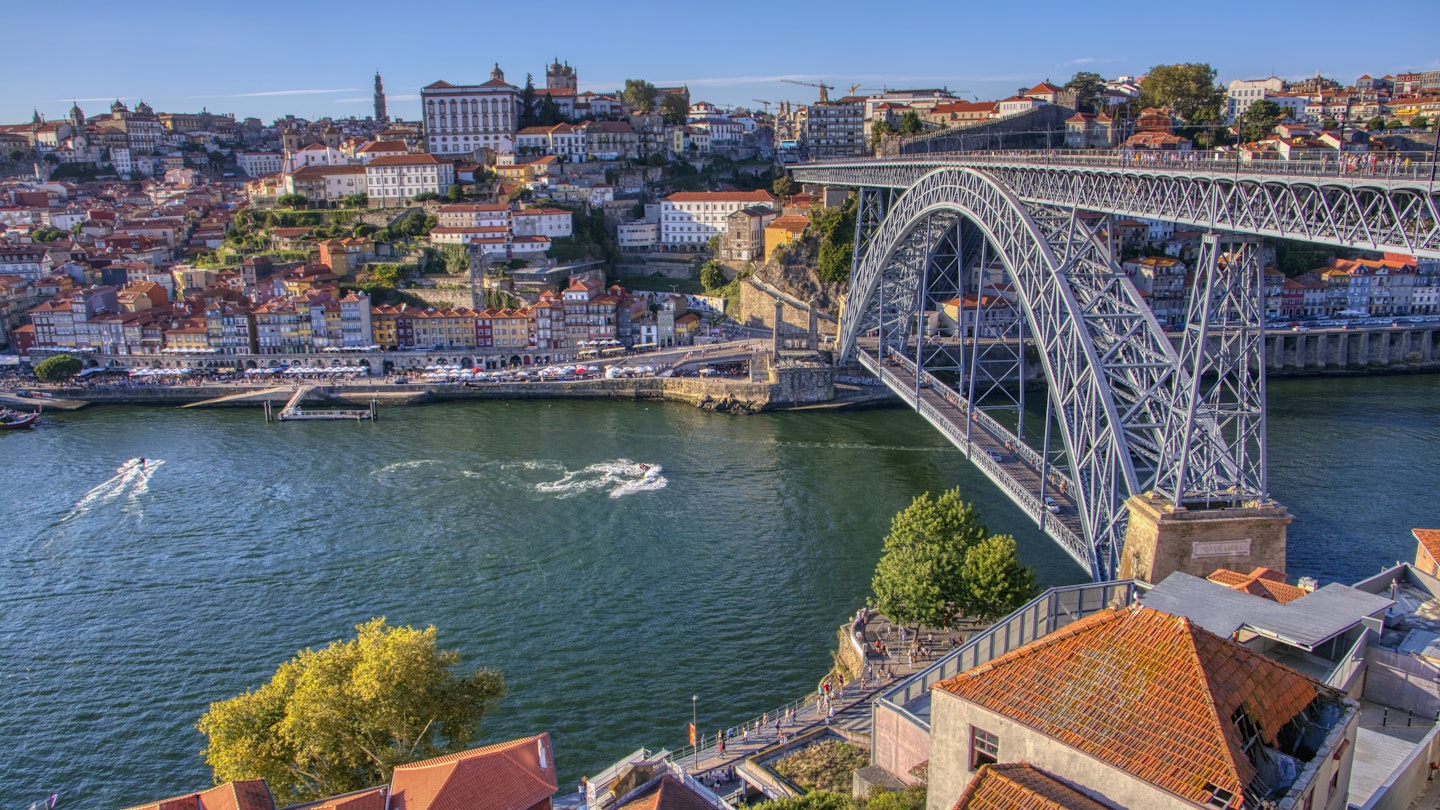
Whether you're looking for parties or peace and quiet, find the best time to visit to Portugal with our guide to all four seasons © iStock
For a packed calendar of traditional celebrations, decadent food festivals, outdoor concerts and many other events, head to Portugal . Summer is the time to catch the biggest range of activities, but in truth, there’s always something happening here .
Festivals aside, it’s not easy to pin down the best month to visit Portugal – that really depends on what you’re after. Outdoor activities in the south? Go in winter, when the crowds are thinnest, the prices are lowest , and the weather is pleasant but not hot. Beach days with plenty of time in the surf ? Visit in summer, when the water temperatures are warmest. A mix of urban exploration and hiking adventures in the wilderness in the north? Opt for the shoulder season, when it’s not so rainy and the cities aren’t yet filled with tourists.
No matter what type of experience you’re seeking, you’ll find your ideal scenario in our comprehensive guide to what's going on when in Portugal. Here's what's happening month-by-month throughout the year.


The high season – June to August – is the best time for the beach
Early summer is one of the liveliest times to visit Portugal, as the festival calendar is packed. Warm, sunny days are the norm, and while tourism picks up, the hordes have yet to arrive, particularly in the first half of June.
During the summer months, you’ll also find warmer ocean temperatures, especially as you head south to the Algarve . Water temps and crowds both peak in July and August, though, so plan on sharing those pretty beaches with plenty of other sunseekers. Lisbon and Porto also swell with crowds, and prices soar in July and August. Book outdoor dining at terrace restaurants overlooking the seaside, catch open-air concerts and film screenings and browse for treasures at street markets. August is Portugal’s busiest tourist month, and reserving months ahead is essential.
Expect higher prices wherever you go, as accommodation prices typically increase by 30% or more during the summer high season. On the plus side, summer is one of the most festive times to be in Portugal, with big national celebrations and lots of local outdoor events.
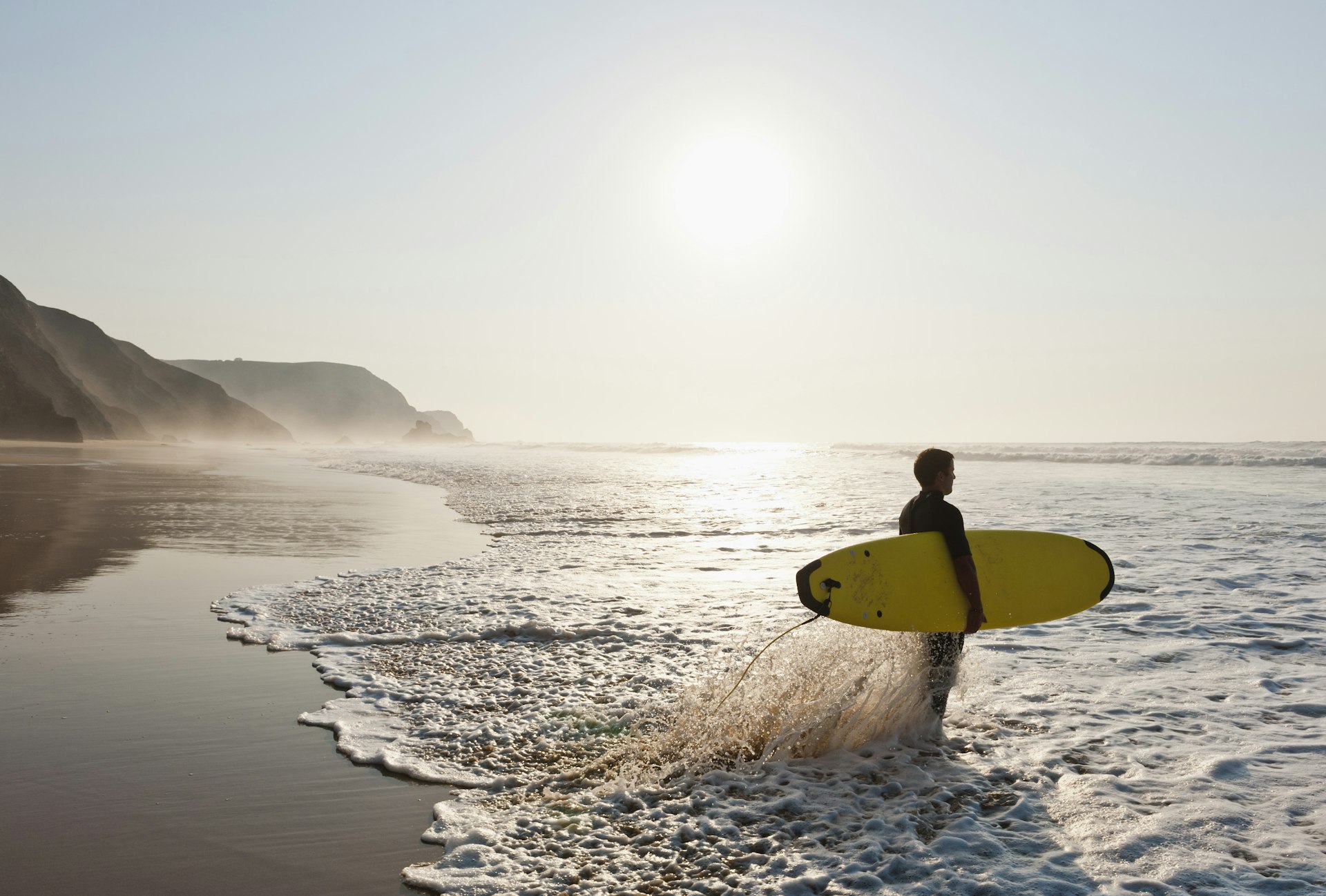
Low-season months of November to March are a cheaper time to visit
If you want to escape the crowds and enjoy rock-bottom prices on accommodations, plan your trip for the low season. Many museums and other attractions keep shorter hours, though you’ll still find a full lineup of performances in cities and bigger towns.
If you come in the winter, you’ll need to prepare for changing weather conditions – rain in Porto and the north, and freezing temperatures at higher elevations. The south, however, has ample sunshine, so it’s a fine time for clifftop walks in the Algarve.
Visit in November and stay along the coast, and you’ll have lovely seaside views all to yourself – but you'll need to pack a light jacket for cooler days and nights, plus the odd rain shower. In the north, it's getting even colder and wetter.
Long nights and cooler days can’t dampen the Christmas spirit in December, with holiday markets, roasted chestnuts and colorfully decorated squares. Days are mostly pleasant in the south but brisk at night, while the north sees cold, rainy days and nights. The sea is quite cold, too, but the biggest waves arrive this month, making it a big draw for surfers.
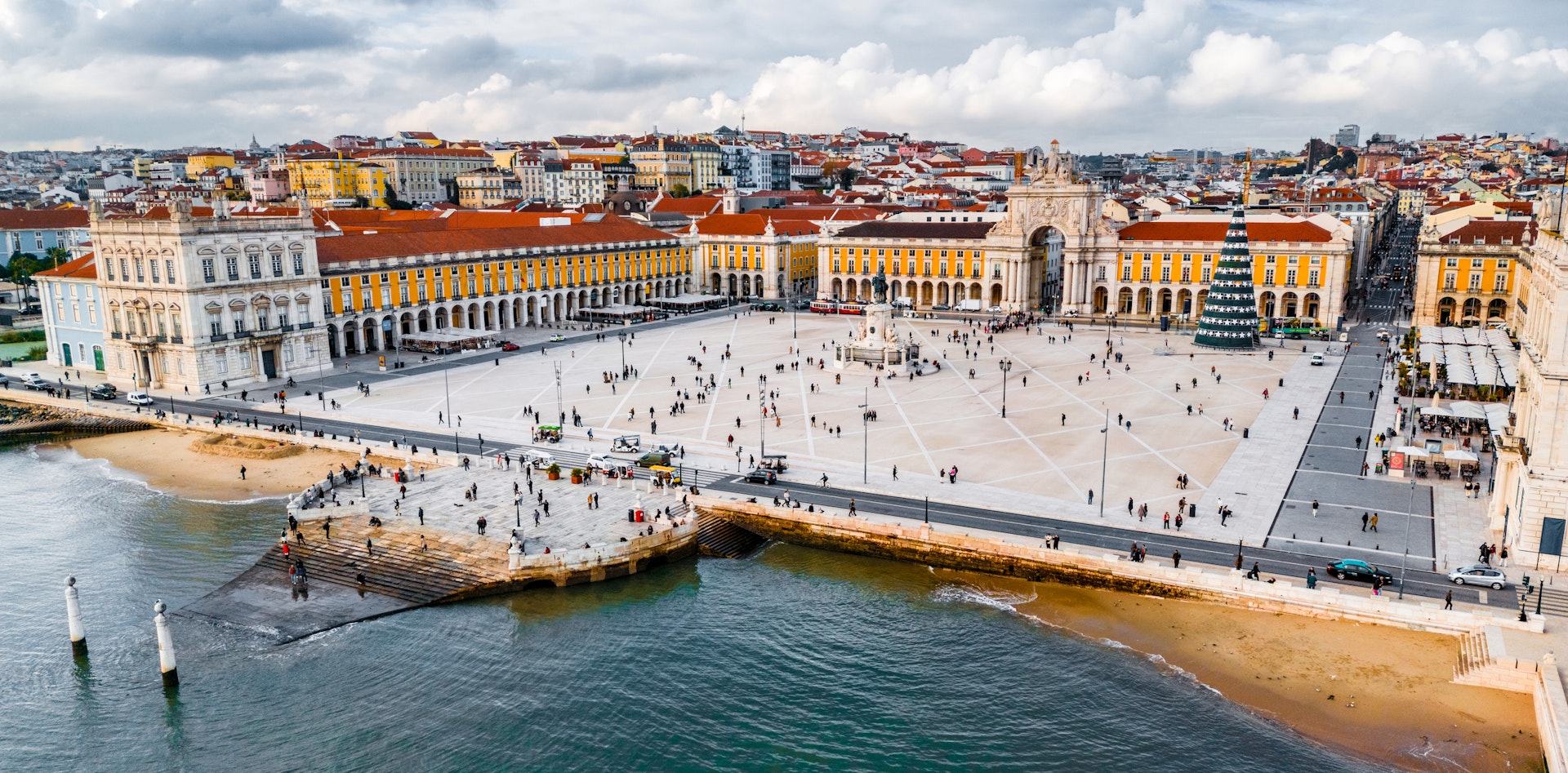
January is a peaceful time to visit, though the weather can be patchy and cool. Dia de Reis (Three Kings' Day) brings the Christmas festivities to a close on January 6.
February is one of the quietest times for overseas visitors, meaning you won’t have to book lodging months in advance. It can be quite rainy in the north, and you can even go skiing at Torres (Portugal’s sole ski resort). Coastal temperatures are cool but mild.
March days are rainy and chilly in the interior and the north of Portugal, though the south sees ample sunshine. Prices and visitor numbers remain low.
Go in April, May, September and October for outdoor adventures
During the shoulder season, you’ll find mild, often sunny days that are ideal for hikes, bike rides and other outdoor activities. This is a great time to check out Portugal’s top natural wonders without the heavy crowds.
Spring arrives with a flourish, bringing warmer temperatures and abundant sunshine in both the north and the south, as well as some major religious holidays, like Holy Week. April sees a profusion of wildflowers in the south, and Easter processions add excitement, as does Liberation Day (April 25), when you can see parades and fireworks in some towns.
Lovely sunny weather makes May an ideal time to visit, especially if you’re hitting a long-distance trail, such as the Via Algarviana or the Rota Vicentina. The crowds are beginning to arrive in Lisbon , Porto and the Algarve, though it’s still a fairly relaxed scene compared to the summertime high season.
The fall can be a magical time to visit Portugal, with changing leaves in the north coupled with grape harvests (and harvest festivals). As in spring, the beaches are much quieter and quite inviting, though ocean temperatures can be bracing. Ongoing warm weather ensures beaches remain packed until mid-September, when peak tourist season officially ends. Then things cool down a bit and prices dip, as the crowds dissipate toward the end of the month.
As the temperatures cool, head to the vineyards of the Douro , where you can see grape harvesting and treading, and even help out. October is also a great month for bird-watching, with many species passing through en route to Africa during the annual fall migration.
This article was first published February 2021 and updated December 2023
Explore related stories

Tips & Advice
Apr 4, 2024 • 4 min read
Northern Portuguese classics and food that's hard to find in Lisbon.

Mar 25, 2024 • 6 min read

Mar 3, 2024 • 6 min read

Feb 28, 2024 • 9 min read

Feb 27, 2024 • 6 min read

Feb 27, 2024 • 3 min read

Feb 25, 2024 • 7 min read

Feb 23, 2024 • 6 min read
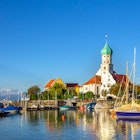
Jan 19, 2024 • 11 min read

Jan 17, 2024 • 8 min read

The best time to visit Portugal: Our season-by-season guide to exploring sun-kissed coastlines and historic cities
With its golden coastline, rolling vineyards, and charming cities steeped in history, Portugal will welcome you with open arms, regardless of the season. Join us on one of our Portugal tours to experience the diverse landscapes and welcoming culture that make Portugal a year-round destination. “There is no place more beautiful, sensitive, and considerate than Portugal, and that’s because of the gorgeous scenery, dramatic historical sites, and the amazingly kind Portuguese people,” said traveler Kathy after joining us on our Portugal: Porto, the Algarve & Lisbon tour .
If you’re asking yourself, “When is the best time to visit Portugal?” check out our season-by-season guide below. We’ll break down the weather in Portugal by month and the distinct charms of each season. Whether you’re drawn to the blossoming landscapes of spring, the joyful festivals of summer, the rich colors of autumn, or the cozy comforts of winter, the best time to go to Portugal is as soon as possible.

Explore more Europe tours

4.7 out of 5 stars

4.6 out of 5 stars

More travel inspiration

Change location
- UK / International
- Call toll-free from 9am EDT 617-223-4521 617-223-4772 or
- REQUEST A QUOTE
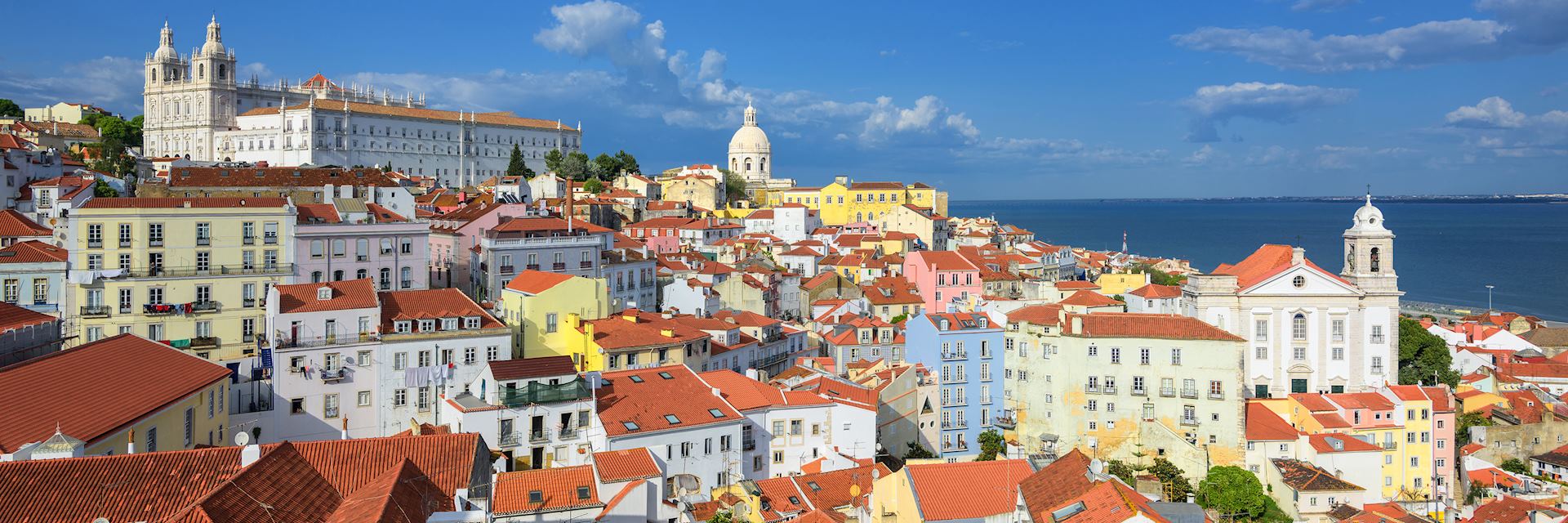
When is the best time to visit Portugal?
- Month-by-month
The best time to visit Portugal is in spring (March-May), when the country is in bloom and waking after the winter. You could also go in fall (between September and October) when the sun is still shining, the weather is warm, and many of the crowds have dispersed.
Summer (June-August) can get very hot, particularly in central Portugal. Large numbers of Portuguese head to the beach during this period, when the water temperatures are warmer than usual. Visitors are drawn by the sunny and inviting southern European climate.
The winters, though colder, still offer a good amount of sun. While many beach resorts wind down at this time, it can still be a good time to explore the cities and inland areas.
- Make an inquiry
- Request a brochure
Month-by-month guide for traveling in Portugal
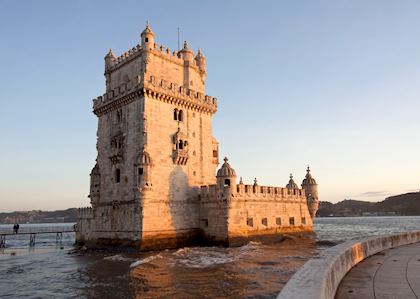
Visiting Portugal in January - February
Portugal’s temperate climate means that any time of year is relatively comfortable for a visit. Although January and February will be a bit cooler and potentially wetter than the rest of the year, you can still experience some sun and take advantage of the thinner crowds.
Events & Festivals
- Carnival (February): Brazil’s Carnival celebrations can be traced back to Portugal; various cities celebrate slightly differently, but the festivities nearly always include vibrant costumes and elaborate parades.
- Dia de Reis, or Three Kings’ Day (January 6): Groups of carolers sing from house to house at the time when Portuguese children traditionally receive gifts (from the kings rather than Santa).
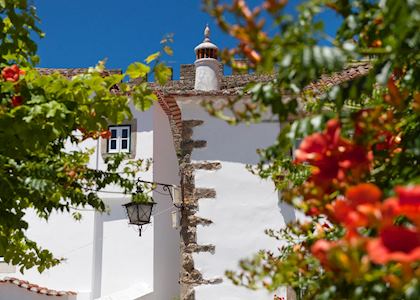
Visiting Portugal in March - May
Temperatures begin to rise to a pleasanter level as the flowers start to bloom and Portugal vibrantly comes to life. Spring is a time for celebration with many important festivals and holidays taking place and adding an extra splash of liveliness.
- Freedom Day (April 25): Marking the Carnation Revolution, which saw the end of Portugal’s nearly 50-year dictatorship (the longest in Europe), with concerts, especially in Lisbon, as well as the annual Corrida da Liberdade, or Freedom Run.
- Holy Week (March/April): Strongly Catholic Portugal celebrates by holding reverent street parades, usually accompanied by lively song and dance.
- Festival de Sintra (mid-May): The town of Sintra hosts a festival dedicated to classical music and opera, with events held in the town’s palaces or gardens.
- Fatima Pilgrimage (May 11 to 13): The largest pilgrimage of the year to the town where, in 1917, three shepherd children claimed they’d seen an apparition of the Virgin Mary six times, the first on May 13.
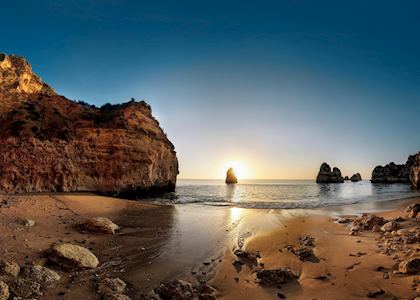
Visiting Portugal in June - August
As the heat of summer reaches its peak, so too do the crowds. Sunseekers from northern Europe head for Portugal’s pristine beaches along with huge numbers of Portuguese. The Algarve in particular gets very busy at this time. While it’s possible to travel at this time, soaring temperatures in the cities and inland can make sightseeing rather hard going, and it’s easy to see why most locals have decamped for the beach.
- Feast of Saint John the Baptist, or Festa de São João, (June 23 to 24): Celebrated across Portugal, especially in Porto, the day is marked with fireworks, concerts, dancing and the interesting tradition of hitting each other with garlic or plastic hammers.
- Portugal Day (June 10): A commemoration of the death of Portuguese poet Luís Vaz de Camões, who’s regarded as one of Portugal’s most influential literary figures.
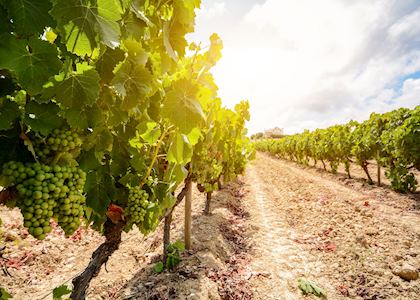
Visiting Portugal in September - October
September and October are two of the best months to visit Portugal. The weather is still warm and pleasant, and the temperatures are much more manageable for sightseeing or hiking. It’s also a wonderful time to visit many of Portugal’s wineries with the grape harvest in full swing. The beaches are also much quieter.
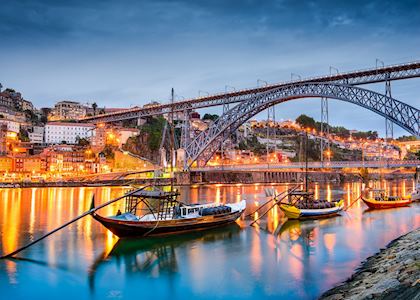
Visiting Portugal in November - December
Portugal’s rainy season begins in November and December, meaning fewer sunny days, but the country still experiences more sun than rain and warmer temperatures than much of Europe. The Algarve usually remains especially pleasant and sunny and can attract European visitors looking for a winter getaway.
- Christmas: Most towns and villages are festively decorated throughout December; the celebrations culminate on the 24th, when most families attend midnight mass and enjoy feasting together.
Portugal Climate Guide
Why travel with audley.
- 100% tailor-made tours
- Fully protected travel
- Established for over 25 years
- 98% of our clients would recommend us

Travel advice
Practical tips for traveling to Portugal, from social protocols to guidance on money matters, with a link to the latest US State Department travel advice.

Request our brochure
Covering all seven continents, The World Your Way shows you how you can see the world with us. It features trip ideas from our specialists alongside hand-picked stays and experiences, and introduces our approach to creating meaningful travel experiences.
Trip ideas and travel guides for exploring Portugal

Highlights of Lisbon & Porto
7 days from $5,950pp
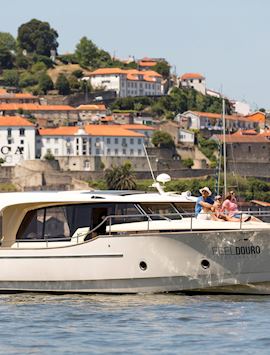
Luxury Portugal tour
12 days from $11,580pp
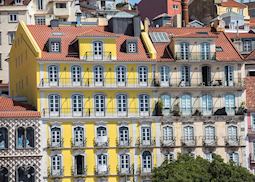
Exploring Lisbon: a city guide
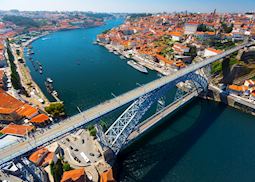
A guide to Porto and the Douro Valley

THE JOURNAL
Travel Inspiration
The Best Time to Visit Portugal: Season-by-Season Guide

The Modern Travel Agency
https://www.foratravel.com/the-journal/best-time-to-visit-portugal
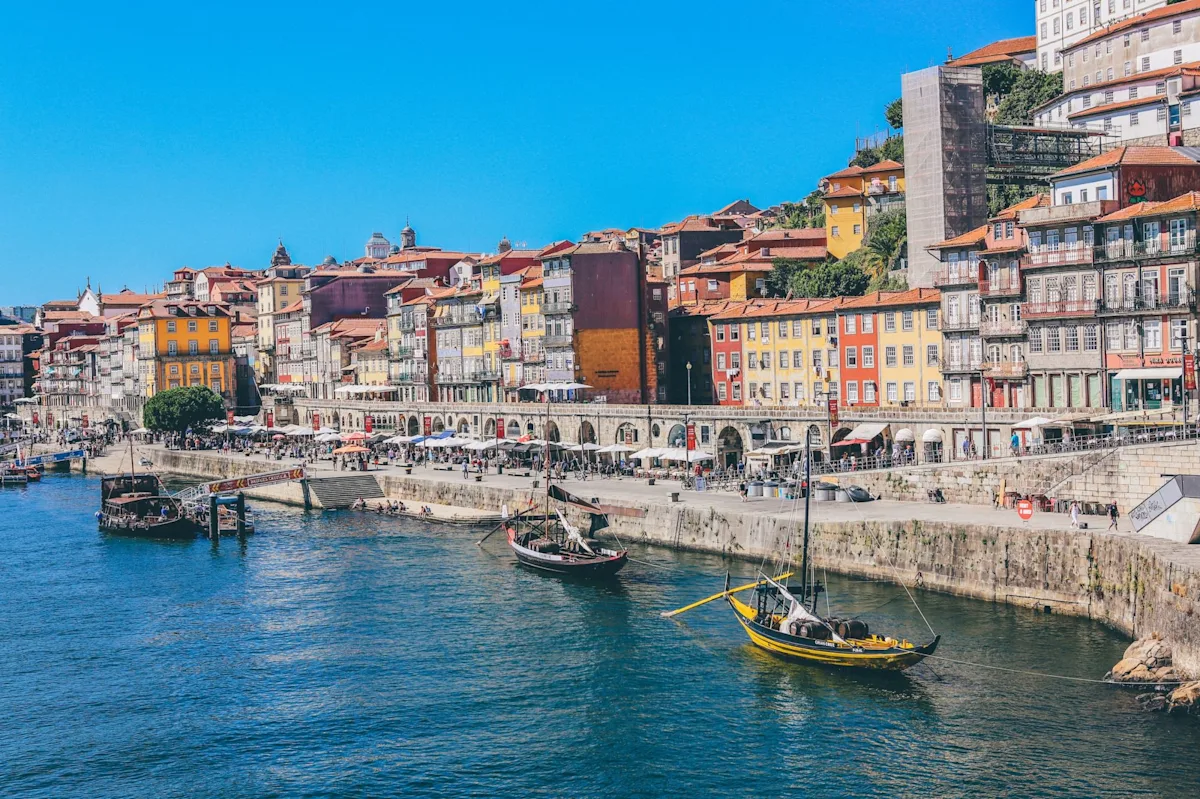
When’s the best time to visit Portugal? We’re covering the broad strokes as well as when to visit for a few niche reasons, like when to avoid crowds or catch the best weather.
Not in a reading mood? Connect with Fora to plan and book your trip to Portugal with a pro travel planner who can tailor your trip to your preferences and budget.
Maybe you want to know the best months to go surfing at a very specific beach. Or perhaps you’re wondering when to visit the best places in Portugal for cultural immersion. No matter the reason you want to visit, we can answer all your travel questions while unlocking VIP hotel perks and other extras for you.
Portugal’s weather in broad strokes: sunny, warm summers & wet, mild winters
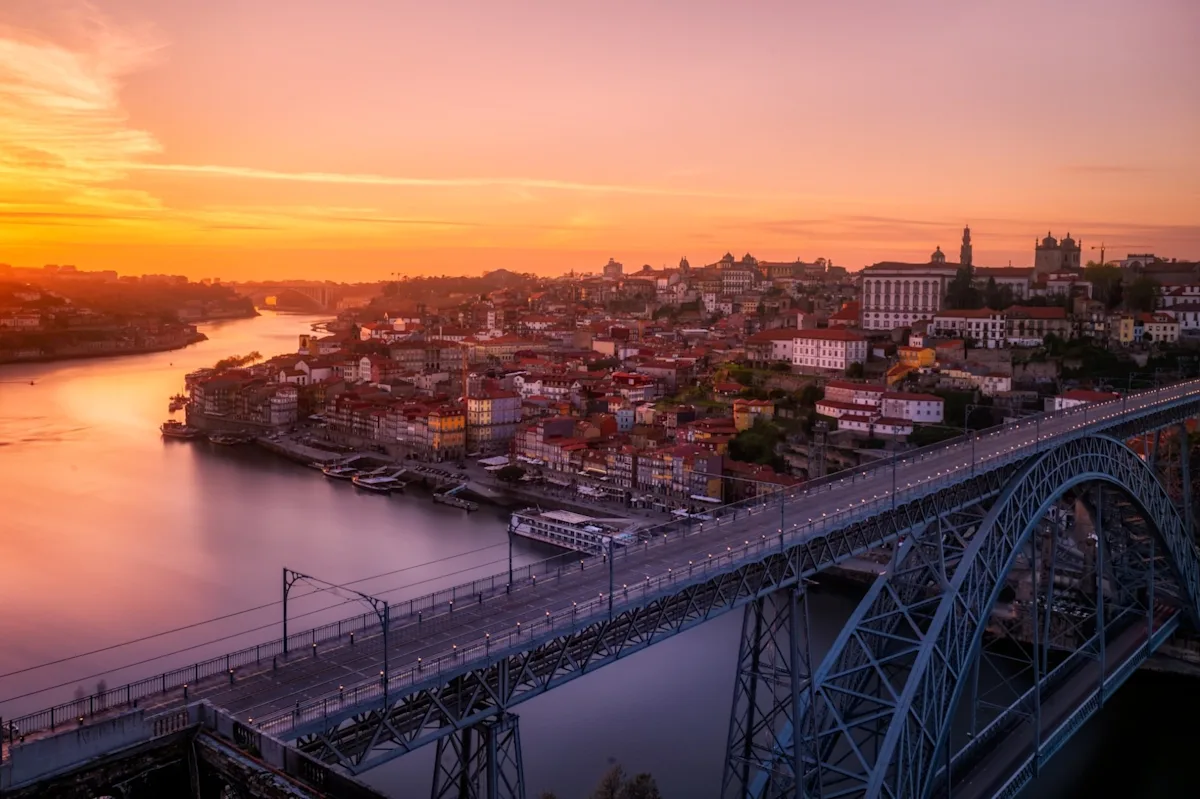
Before we get to Portugal’s seasons, it helps to understand the country’s climate. Broadly, Portugal has mild highs and lows — it’s rarely sweltering, nor is it ever frigid (outside of the mountains, of course).
Throughout most of the year, Portugal is sunny and comfortable, with only occasional showers in spring and summer. Southern Portugal is notably dryer than the country’s northern regions throughout the year, which may be something to consider if you’re planning on visiting Porto or Lisbon.
(Love the idea of visiting Portugal’s coolest cities? Check out the top hotels in Lisbon or the top hotels in Porto . Or see both and plan a road trip from Lisbon to Porto .)
Season-by-season guide to visiting Portugal
Here’s a quick breakdown of each season’s claim for why it’s the best time to visit Portugal.
And remember: if you’d like pro advice on when to visit Portugal (for any reason), book and plan your trip with Fora .
Summer: the best time to visit Portugal for great weather & to enjoy the beach
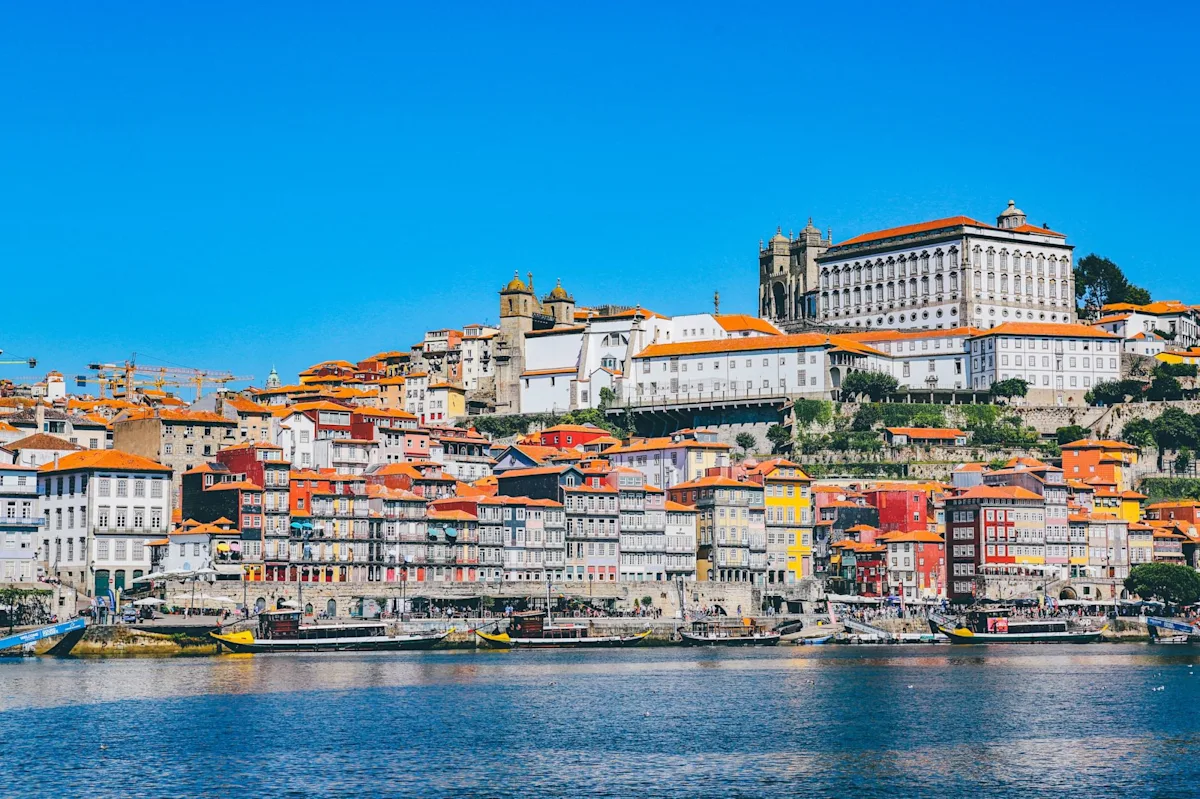
With nearly nonstop sunshine, the scenic Atlantic coast and comfy temperatures that rarely exceed the mid-to-high 80s on the coasts, summer is the absolute best time to visit Portugal if you’re keen on checking out the country’s natural beauty and beaches.
Northern Portugal’s beaches can still be fairly cool in early summer, and the country’s interior (like the lovely Douro Valley) can get pretty hot, but for the most part, this is the best time to visit Portugal for great weather.
On the flip side, June through August is also Portugal’s high travel season, so you can certainly expect more crowds, especially in the major cities.
(Curious about beach resorts in Portugal? See our guide.)
Autumn: one of the best times to visit Portugal for experienced surfers, to avoid crowds & more

Autumn is a good time to visit Portugal if you want to enjoy mild temperatures and skip the worst of the travel crowds. This is Portugal’s shoulder season, so many attractions throughout the country are still open, and prices are a bit more favorable than they are during summer.
Portugal’s Algarve region, for example, tends to see a sharp decline in travelers even though the weather is still generally agreeable. And if you’re experienced, this can be the best time to visit Portugal for surfing — the waves are much stronger in autumn, and the colder ocean temperatures discourage crowds.
However, it’s worth noting that rain becomes increasingly more common as the season progresses, particularly in northern Portuguese cities like Porto. For most, the rain typically isn’t enough to dissuade travel, but it’s worth considering if you’re planning lots of outdoor activities.
(P.S. Want to check out the Algarve? See our guide to the best hotels in the Algarve, Portugal .)
Portugal in winter: the best time to visit Portugal to experience the cities’ cultural sights (and for lower rates)
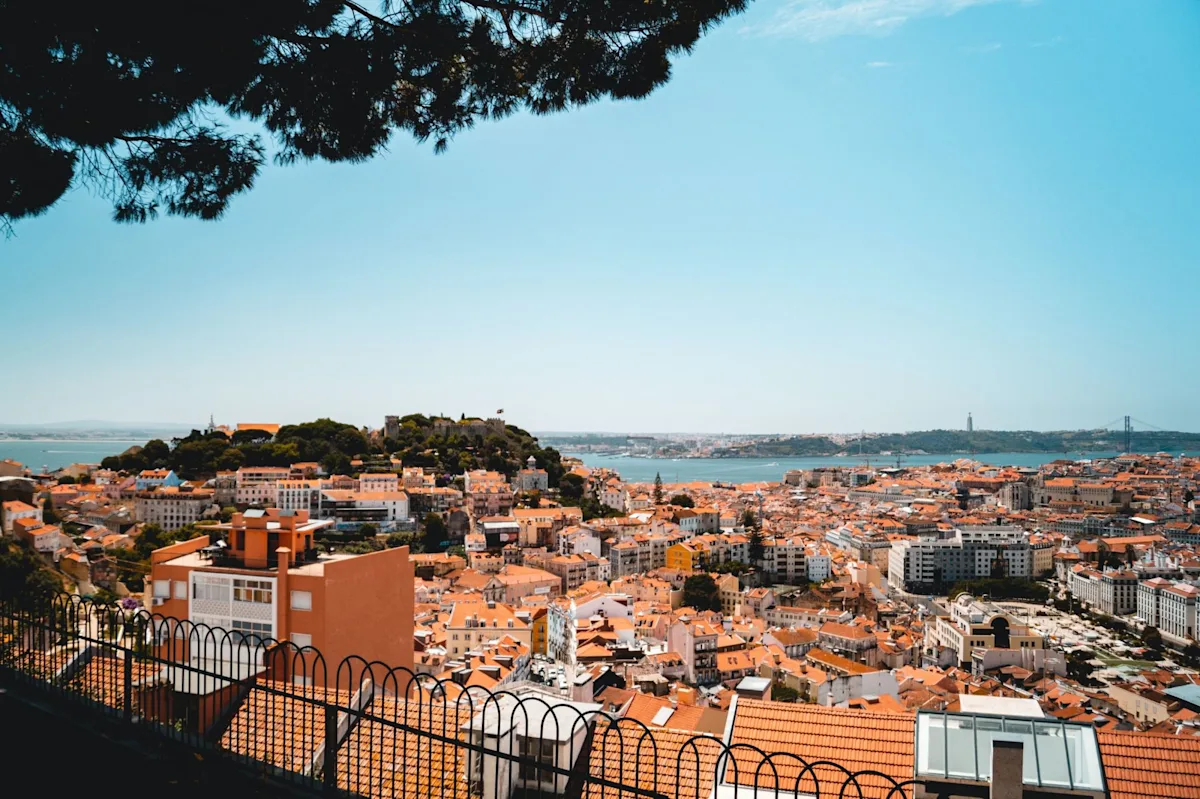
Winter is a great time to sightsee in Portugal because even though it’s noticeably cooler than it is in summer, it’s certainly not freezing, either. You can totally explore most cities and towns in light layers during the day. Winter also begins Portugal’s holiday season, so it can be an extra magical time to visit.
Moreover, Portugal doesn’t get a ton of travelers in winter, so hotel rates are generally more affordable — except for the mountainous regions, where snow sports draw travelers from all over.
Otherwise, the only major downside is that Portugal experiences a lot of rainfall in winter, with more average rain the further north you travel. Coupled with large waves and minimal beachgoers, though, winter presents an ideal time for expert surfers.
(Need itinerary ideas? Read our guides to things to do in Lisbon and things to do in Porto, Portugal .)
Portugal in spring: a great time to visit for light crowds, blooming flowers & mild weather
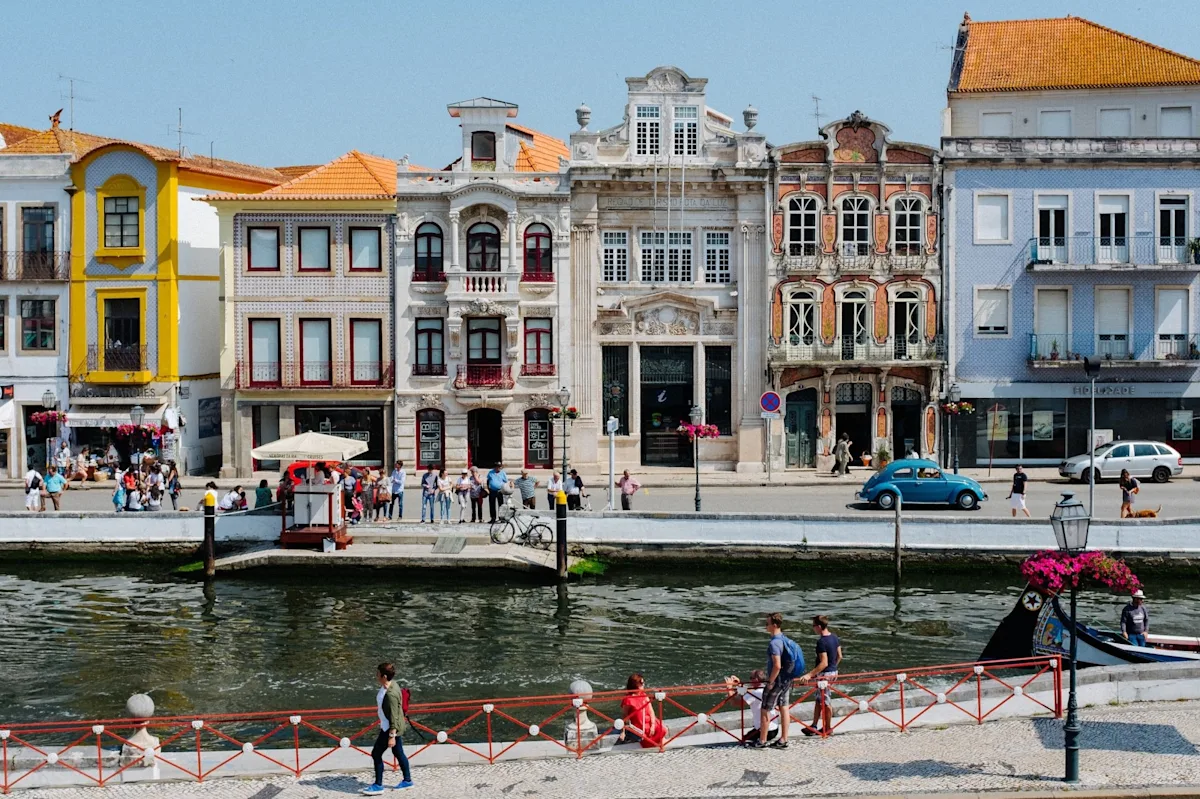
Visiting Portugal in spring is comparable to doing so in autumn, except rain and cool weather obviously become less common as the season goes on.
April to early June counts as shoulder season, too, so the crowds are generally manageable, especially outside of the busiest places to visit in Portugal.
The key difference between fall and spring in winter is that the beaches are still (for the most part) too cold to really enjoy. Beginner surfers may appreciate the smaller waves, but on the other hand, waves can be inconsistent, so it’s hard to plan for beach trips.
The best time to visit Portugal for niche reasons
Read on for quick answers to some of the most commonly asked questions about the best times to visit Portugal.
Or get personalized travel suggestions when you plan and book your trip with Fora .
What are the best months to visit Portugal for lower prices?
This depends on the region or city to an extent, but winter is generally the best time to go to Portugal for lower prices across the board (i.e. hotels, rental cars, meals, etc.). Spring and fall also tend to offer more affordable rates, but this is more region specific.
When is Portugal’s rainy season? Which part of the country receives the most rainfall?
Northern Portugal, including the city of Porto, receives significantly more rainfall than the bottom half of the country throughout the year. However, Portugal’s rainy season generally extends from late fall to early spring, peaking in winter.
When is the best time to visit Portugal for wine tasting?
Fora Advisor Eva Alcaide says, "The harvest season runs from September to October. You can witness the winemaking process, participate in grape picking activities and experience the lively atmosphere of wine festivals. Then during spring (March to May), the vineyards are lush and green with the picturesque landscapes."

- Barcelona ,
- European Cities ,
When is the best time to visit Portugal for surfing?
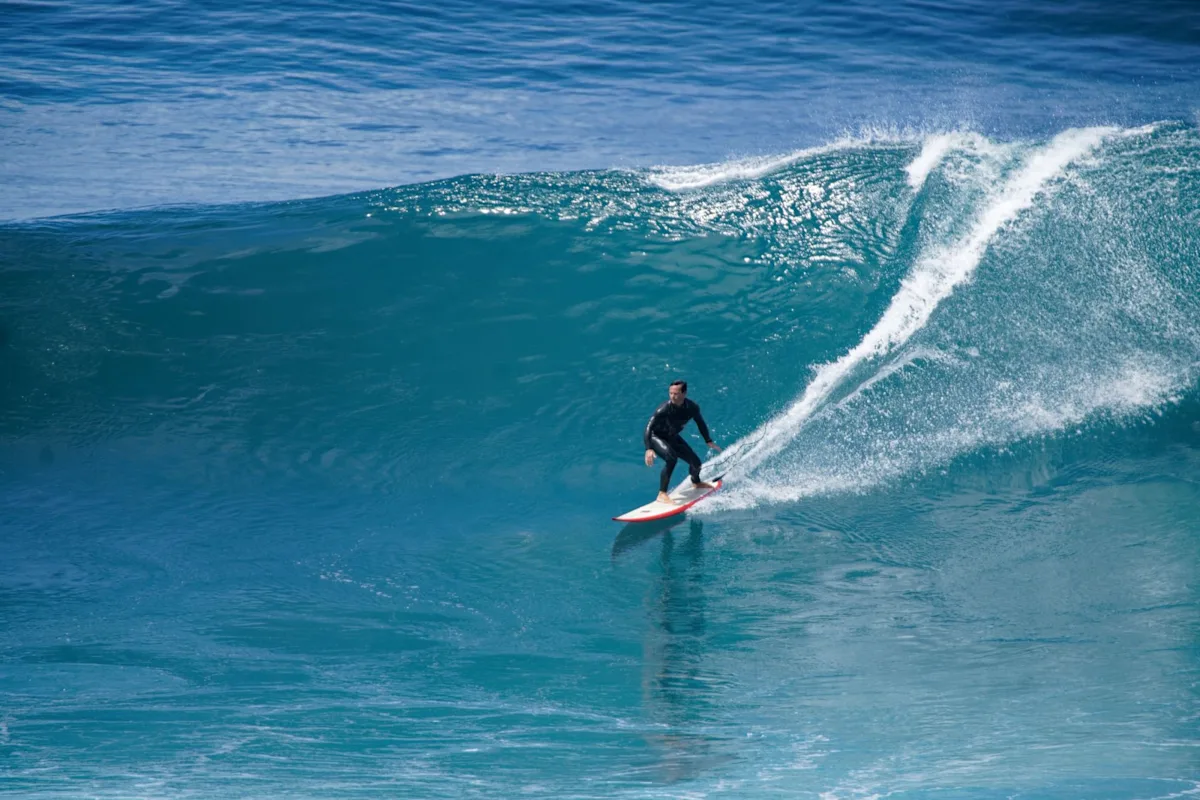
This depends heavily on your skill level. Summer and spring can be good for beginners, but it’s worth noting that waves can be inconsistent and crowds can make the conditions unpleasant.
Fall and winter bring larger waves and fewer people, creating excellent conditions for experienced surfers who don’t necessarily mind the chilly temperatures.
Need more intel? Connect with Fora to plan and book your surfing trip to Portugal (or anywhere).
Is there a “worst” time to visit Portugal?
Hardly! Portugal is a gorgeous and culturally rich country — it’s hard to be bored here no matter when you visit. On the other hand, if you’re visiting for a very particular reason, there are less-than-ideal times to visit the country.
When is the best time to visit Portugal for festivals?
There’s always something going on in Portugal, so it depends on what types of festivals you’re most interested in. Music festivals are most often held in summer, while arts and culture festivals are more common in fall and spring. Gastronomy events, however, are typically held in winter.
Ultimately, this is something that’s hyper-specific to cities or regions.
When should you go to Portugal to avoid crowds?
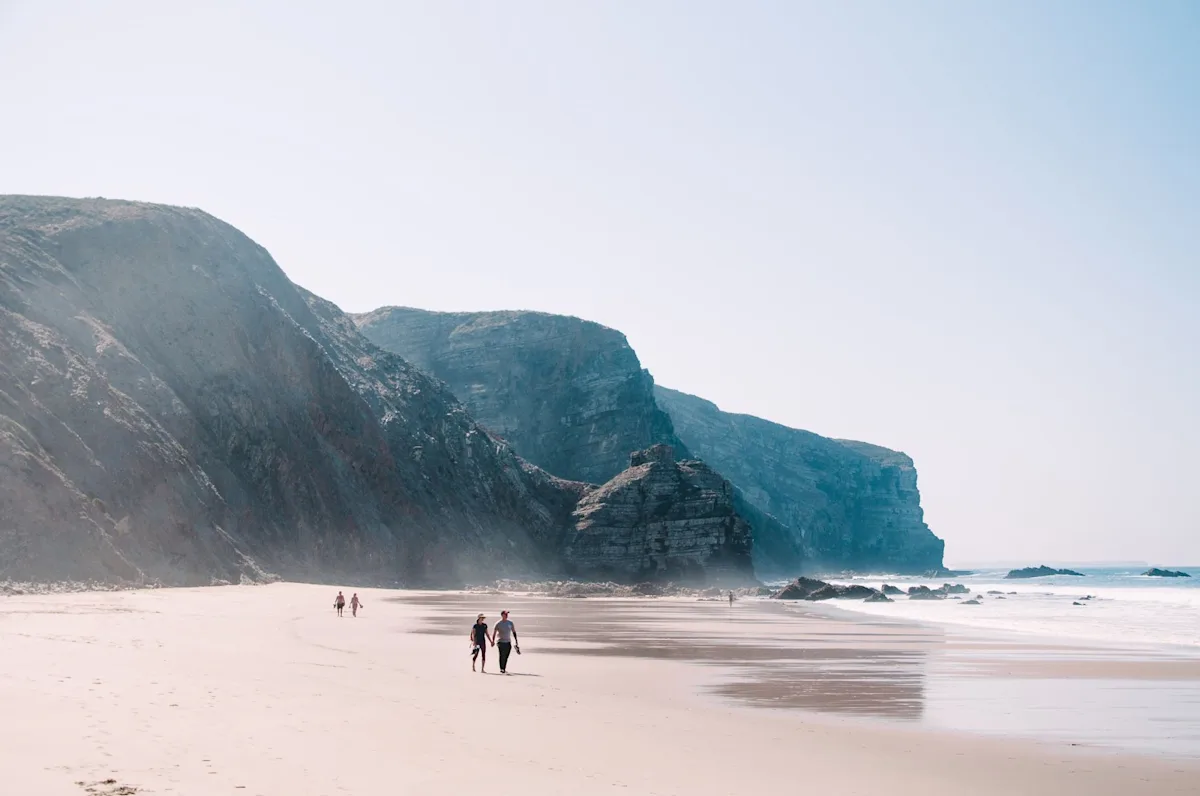
Portugal’s busiest season is summer, with crowds slowly dispersing from fall to winter, then gradually rising throughout spring.
There are some exceptions, though. For instance, Portugal’s mountain regions see more travelers in winter because of the snow sports opportunities.
Need to know the best time to visit Portugal for your itinerary? Plan with Fora
Need help deciding your best time to visit Portugal? Plan and book your trip with Fora . We'll help you build a plan that fits your budget and interests — whether that’s avoiding crowds, skiing in the Azores or anything in between — while unlocking awesome travel perks along the way and providing you with one-on-one support any time you need it.
Even better: booking with us costs the same as booking by yourself.
Need more Portugal travel inspiration? Check out the guides below:
10-Day Glorious Autumn Itinerary in Portugal: Porto, Lisbon & Sintra
The Best Area to Stay in Lisbon: 6 Exciting Options
Luxury Hotels in Lisbon, Portugal: 5 Ritzy Choices Near Baixa
Traveling From Lisbon to the Algarve by Train, Car, Bus or Plane
This article has been fact checked by Fora Advisor Eva Alcaide , an expert on travel to Portugal .
Book with Fora
Tell us more about yourself to get matched with a Fora Advisor and start planning your dream trip today.

The Best Time to Visit Portugal: A Comprehensive Travel Guide
By: Author Tiana Thompson
Posted on Last updated: July 13, 2023
Categories Portugal , Travel Guides
Home » The Best Time to Visit Portugal: A Comprehensive Travel Guide
- 239 Share on Twitter
- 352 Share on Facebook
- 753 Share on Pinterest
- 275 Share on LinkedIn
- 545 Share on Email
Has the urge to explore Portugal suddenly hit you like a craving for pastel de nata? I know the feeling! But hold on a minute before you go booking those flights, amigo.
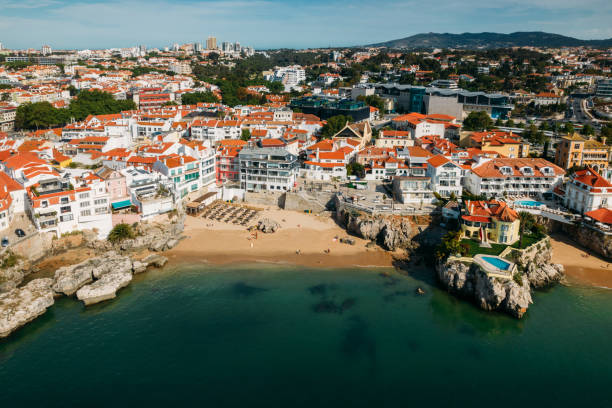
Choosing when to visit Portugal can be a bit like choosing the right moment to open a bottle of aged port – timing is everything. Get it wrong and you might find yourself in a tourist-packed Lisbon tram, longing for a bit of breathing room.
Or you could miss the grape harvest festivals in the stunning Douro Valley, which would be a real pity.
Fear not, your intrepid travel guide is here! With my expert solo traveler badge shining bright and fresh memories from my third trip to Portugal, I’m here to share the ins and outs of planning your Portuguese getaway. I’ve braved the high season crowds, enjoyed the off-season peace, and sussed out that sweet spot in between.
Read on to find your ideal time to visit Portugal!
In this post, you'll find...
When is the Best Time to Go to Portugal?
Let me spill the tea right off the bat: In my humble experience, early June to late September is the best time to visit Portugal.
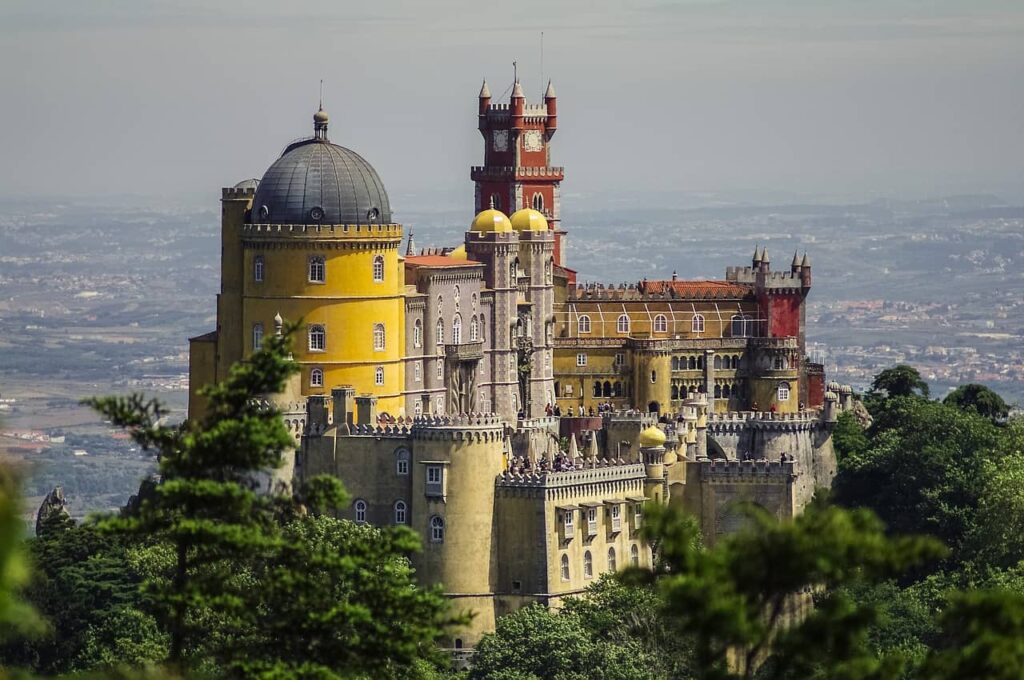
This is your sweet spot for catching Portugal in all its sun-soaked glory. This time of year, you’ll be soaking up warm weather, crystal-clear blue skies, and fewer crowds (cause who doesn’t love a bit of breathing space, right?).
The best month to visit, you ask? If we’re playing favorites, I’d say September. Why? It’s simple: summer heat is beginning to cool off, the Atlantic Ocean offers perfect sea temperatures for a refreshing dip, and let’s not forget – wine harvest time in the Douro Valley!
Plus, the hotel rates take a nosedive after the peak season (read: summer months). Now, who doesn’t love a good bargain?
What is the Cheapest Month to Go to Portugal?
Remember when your parents told you that patience is a virtue? Well, it turns out they were onto something.
If you can hold out for the shoulder season, typically November through March (excluding the Christmas/New Year rush), your patience will pay off big time. This is hands down the cheapest time to visit Portugal. We’re talking fewer people, lower prices, and all the pastel de natas you can eat without having to elbow someone out of the way.
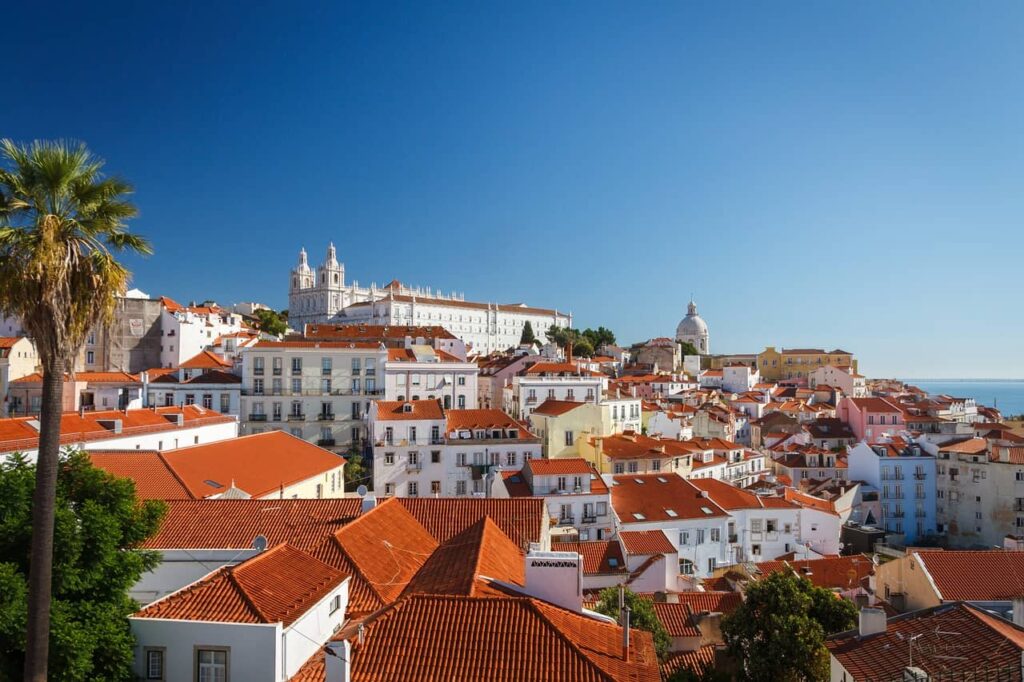
Sure, it’s a bit chillier, but mild winters mean you can still enjoy the great outdoors. Plus, hotel rates take a steep plunge, leaving you with extra dough to enjoy the best food in Portugal (and trust me, your taste buds will thank you!).
Wondering where to get the tastiest bites? Check out my guide on the best food in Portugal .
Alright, that’s a start. We’ve covered when to visit for great weather and when to go for the best deals. But we’re just scratching the surface. Keep reading as we dive into the nitty-gritty details about Portugal’s seasons, notable events, and the best times to visit specific regions.
Portugal Temperatures by Season
Alright, let’s play Goldilocks and find you the season that’s “just right.” Whether you want to catch some rays, hike in cooler climes, or wine-taste your way through the Douro Valley, I’ve got the lowdown on what to expect weather-wise.
Spring in Portugal
Spring, glorious spring! As winter retreats and the beautiful blooms start making their appearance, Portugal begins to shake off its winter coat from March. The average temperature dances between 15°C to 20°C. It’s a great time to enjoy outdoor activities, and the country’s natural landscapes come to life. And let’s not forget the Holy Week (Semana Santa) in April – a deeply traditional event worth experiencing.
Summer in Portugal
Portugal in the summer months (June to August) is like a big, sizzling fiesta. The average temperature often flirts with the 30°C mark, and sun-soaked beach days are plentiful.
View this post on Instagram A post shared by Tiana (@wheretianatravelss)
Portugal’s beautiful beaches, especially in the Algarve region, become a haven for sun worshippers. The water temperatures are immaculate this time of year. But be warned – it’s high season, so expect more bodies soaking up the sun alongside you!
Autumn in Portugal
In my opinion, Autumn could be the best season to visit Portugal. From September to November, temperatures hover between a comfortable 15°C to 25°C. It’s harvest time in the vineyards, so you can have a grape ol’ time wine tasting in the Douro Valley. The smaller towns in central Portugal, like Coimbra and Aveiro, are especially captivating during this time of the year.
Winter in Portugal
Winter, which runs from December to February, is the coolest season, with average temperatures around 10°C to 15°C. While the northern parts see some rainy days, southern Portugal often enjoys a Mediterranean climate with plenty of sunny days. The winter season is also a good time to visit major cities like Lisbon and Porto. Fewer crowds, pleasant weather, and the magical midnight mass during Christmas – sounds like a good idea, doesn’t it?
Portugal offers a charm for every season, making it a year-round destination. Whether you love hot summers, mild springs, picturesque autumns, or cool winters, Portugal has you covered. Just pack accordingly, and don’t forget your sense of adventure at home.
Key Events in Portugal (by season)
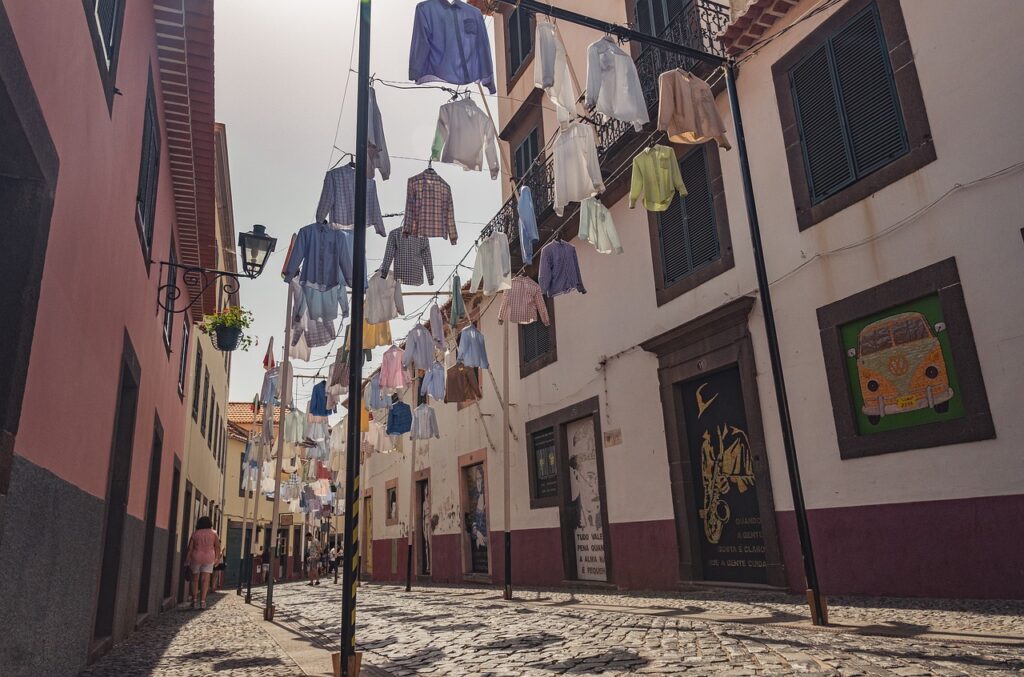
Buckle up, my festive friends, because Portugal knows how to party. Whether you’re into music, religious ceremonies, or wine (yes, there’s a festival for that), you’re in for a treat. No matter when you visit, Portugal is ready to welcome you with a celebration.
Here’s a rundown of some of Portugal’s biggest events by season:
Spring Events
Let’s start with spring, a wonderful time for celebrations. The festivities kick off with the Holy Week (Semana Santa) in April, a deeply traditional event that’s taken seriously, especially in the towns of Braga and Santarém. Parades, processions, and ceremonies – it’s a spectacle to behold.
Then there’s the Festa das Cruzes in early May in Barcelos. Known as the “Festival of the Crosses,” it marks the city’s founding with music, crafts, and a spectacular fireworks display.
Last but not least, we have the Iberian Mask Festival in Lisbon in mid-May. You’ll get to see amazing traditional masks and costumes from across Portugal and Spain.
Summer Events
Summer is peak festival season. The party starts with the Festa de Santo António in Lisbon in June. This is Lisbon’s biggest street party, and it’s all in honor of Saint Anthony, the patron saint of lost things and…matchmaking. Love might just be in the air!
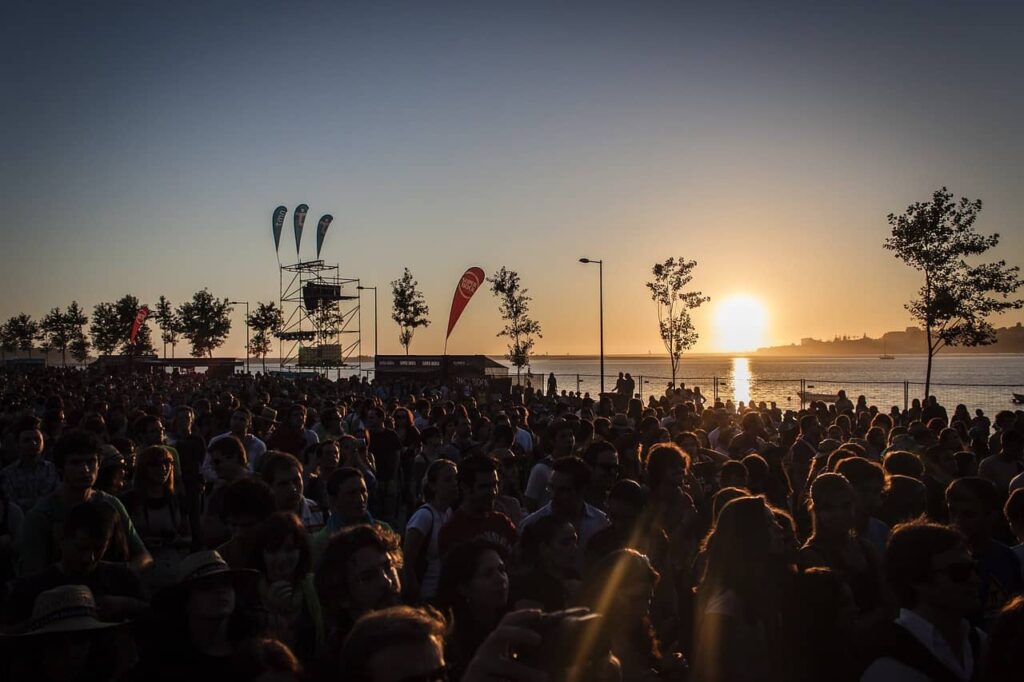
The revelry continues with the Festa de São João in Porto on June 23rd. There’s dancing, grilled sardines, and everyone hits each other on the head with plastic hammers. It’s quirky, it’s fun, and it’s a must-see.
And for the music lovers, NOS Alive in Lisbon and Super Bock Super Rock in Sesimbra in July are the top picks. They attract big international acts, so prepare for some epic nights.
Autumn Events
As summer winds down, the party continues into autumn. The grape harvest season in late September sees Douro Valley and Porto come alive with grape stomping festivities, vineyard tours, and wine tastings galore. It’s the perfect event for wine aficionados.
Then, there’s the Feira de São Mateus in Viseu, one of Portugal’s oldest fairs. Running from August through late September, the fair offers music, food, crafts, and bullfights.
Winter Events
Winter in Portugal is a time for beautiful lights, warmth, and family. Christmas is a major affair, especially the Midnight Mass on Christmas Eve. Towns and cities are beautifully decorated and there are numerous Christmas markets to explore.
But the real party starts on New Year’s Eve. Whether you’re in Lisbon, Porto, Madeira, or Algarve, you’re guaranteed spectacular fireworks, live music, and a whole lot of fun. In Madeira, the fireworks display is so grand it once held the Guinness World Record for the largest fireworks show.
Best Time to Visit Specific Regions in Portugal
Alright, fellow adventurers, we’ve had a grand overview, now let’s get specific. Portugal may be a small country compared to its European counterparts, but its different regions boast distinct weather conditions and vibes.
Let’s take a closer look at the when’s and where’s of three key regions: Algarve, Lisbon, and Porto.
If your dream getaway involves beautiful beaches, water sports, and soaking up the summer heat, then Algarve, the southernmost region of Portugal, is your perfect place.
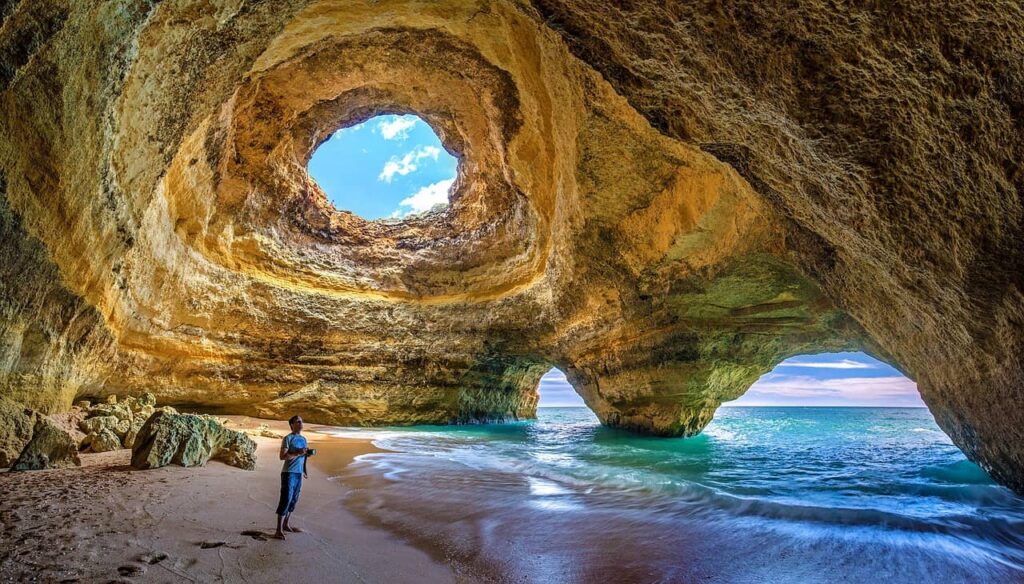
The best time to visit? That’s between June and September when warm weather and blue skies are the order of the day. The sea temperatures are blissful, perfect for a quick dip. However, if you prefer fewer people and lower prices, late spring (May) or early autumn (October) offer a great balance of good weather and fewer crowds.
Now, let’s talk about Lisbon. This vibrant city is a joy to explore year-round, thanks to its mild Mediterranean climate. But if you’re after sunny days, summer (June to August) is your winner.
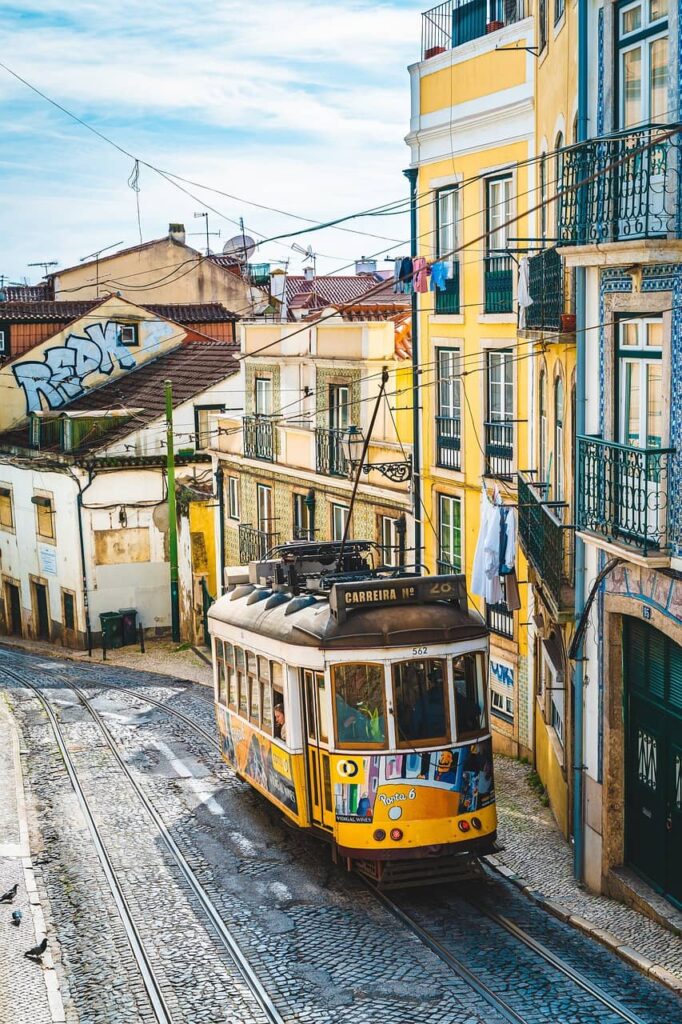
However, for a cooler climate and fewer tourists, spring (April to June) and autumn (September to November) are fantastic. Don’t miss the Festa de São João in June – it’s a good reason to plan your trip during this time!
Planning your Lisbon trip? Be sure to check out my Where to Stay in Lisbon guide for an in-depth look at the best neighborhoods and hotels in Lisbon.
Last but not least, let’s head up to Porto. The best time to enjoy Porto’s pleasant weather and vibrant outdoor festivals is between May and September.
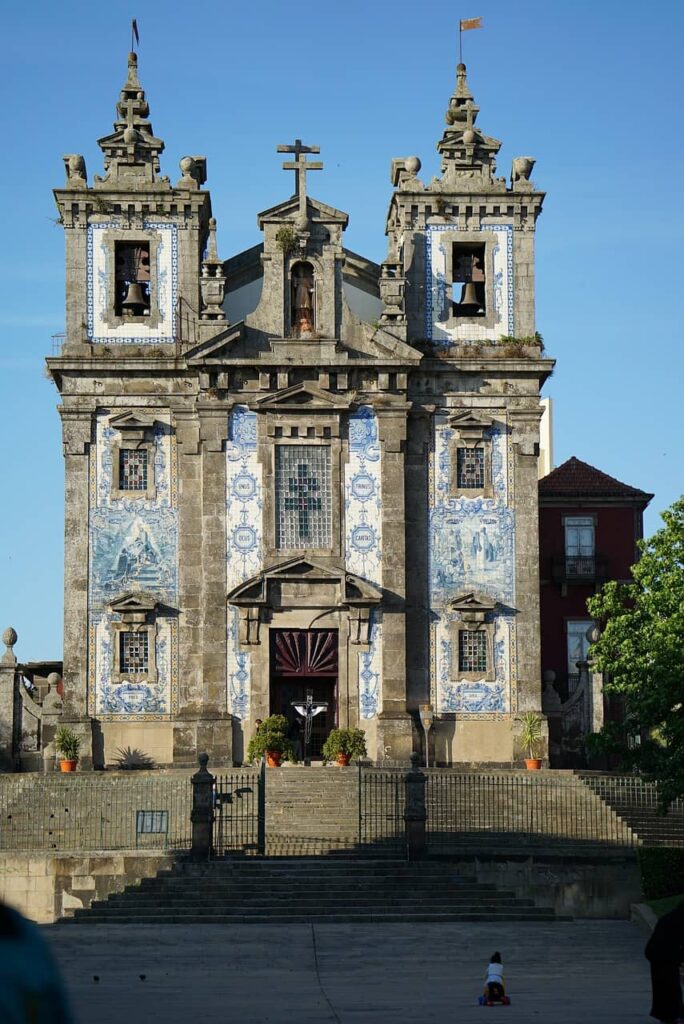
Do you love wine? Then you must visit in September, the start of the grape harvest season. The Douro River region is a must-visit for wine lovers! But don’t fret about the summer heat; the Atlantic coast breeze is a natural cooler.
Whether you’re basking in the sun-soaked beaches of Algarve, hopping on a historic tram in Lisbon, or sipping fine wine in Porto, there’s really never a bad time to visit Portugal.
Essential Tips for Traveling to Portugal
Alright, it’s time for some hot tips to help you navigate Portugal like a pro. Trust me, I’ve learned some of these the hard way!
First things first: pack smart. If you’re heading for the summer season, don’t forget your swimsuit, sunscreen, and sunhat. For the cooler, rainy days of winter, a sturdy umbrella and layers are key.
Next up: Portugal operates on ‘Portuguese time.’ Things run a bit slower here, so relax and go with the flow. Remember, you’re on vacation!
When it comes to food, Portuguese cuisine is a treat for the palate. Don’t miss the famous pastel de nata (custard tart) and the mouth-watering seafood dishes. Oh, and definitely try the vinho verde, an effervescent young wine unique to Portugal.
Finally, knowing a few basic Portuguese phrases will go a long way in connecting with the locals. Don’t worry, most Portuguese people speak excellent English, but they appreciate the effort!
Final thoughts
And there you have it – your complete guide to the best times to visit Portugal.

From the sunny beaches of the Algarve to the historic trams of Lisbon, Portugal is a captivating blend of natural beauty, vibrant culture, and friendly people. And with a bit of planning around the seasons and a sprinkle of local knowledge, you’re all set for an unforgettable adventure.
Remember, whether you’re a beach bum, a history buff, a wine connoisseur, or a foodie, there’s never a bad time to visit Portugal. Every season offers a unique charm and a wealth of experiences. So what are you waiting for? Pack your bags, board your flight, and get ready to create your own Portuguese story.
Boa viagem (have a good trip)!

Hi, I’m Tiana – founder of and author here at Where Tiana Travels. I’m a 20-something with a love for all things travel, photography, and food. I have been living abroad for the past 5 years and solo traveling the globe in my free time. I created this blog to share my travel stories and inspire other women to go out and see the world. Read more about me here!
- 445 Share on Facebook
- 66 Share on Twitter
- 225 Share on Pinterest
- 86 Share on LinkedIn
- 209 Share on Email
The best times to visit Portugal
From hydrangea blooms to holiday markets..

In recent years, you may have noticed more and more of your friends booking trips to Portugal , and it’s not hard to see the appeal: In a country roughly the size of Indiana, you’ll have access to the world-class museums and historic sites of the capital city Lisbon , the sun-drenched beaches of the Algarve, the wineries of the Douro Valley, and the up-and-coming culinary and design scenes of Porto . So when’s the best time to visit? The short answer, surprisingly, is anytime you want. Thanks to its location at the southwestern corner of Europe and its position as a still-emerging destination, Portugal sits in a sweet spot that few European countries occupy: During the winter low season, the weather is still rather lovely; during the summer rush, there are still deals to be found and pockets of the country not yet overrun by tourists. Here, our guide to the best seasons to discover this Iberian gem.
Best for low-season Lisbon deals: January to March
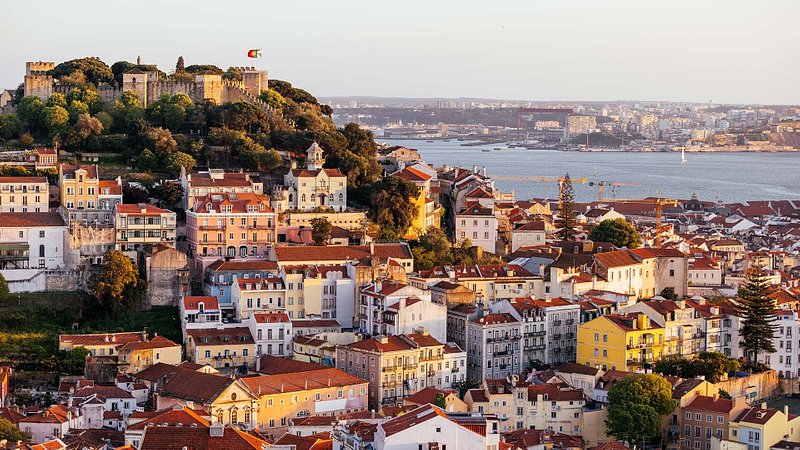
Roughly speaking, the low season in Portugal runs from November to March, excluding the weeks surrounding Christmas and New Year’s Day. Many resort towns will go quiet during the winter, but for deal-seekers, it’s an incredible time to explore Lisbon. Hotel rates plummet, museums are blissfully free of crowds, and you can finally snag a seat at some of the cities’ hottest bars and restaurants. That comes in particularly handy at no-reservation spots like A Cevicheria , where you can sip pisco sours under a giant octopus model, or Taberna da Rua das Flores , where daily specials (like mackerel tartare) are written on a chalkboard.
Temperatures remain surprisingly mild—with average highs in the upper 50s in January, usually the coldest month—but it can get a bit rainy, so this is the season to immerse yourself in culture. Visit museums like the Museu Nacional de Azulejo or the Museu Coleção Berardo , catch a performance of fado music, or eat your way around Time Out Market Lisboa , where the city’s top chefs operate fast-food-style counters. When it comes to hotels, book a night at The Ivens , a Travelers’ Choice Award winner that opened in 2021, blocks from the Praça do Comércio.
Best for peaceful beach holidays: May and September

The Algarve region is blessed with some of the most beautiful beaches in Europe, centered around bustling resort towns like Albufeira , with its nearby Moorish castle ruins, and Lagos , where sandy coves are hemmed in by dramatic cliffs. From June through August, you’ll be jockeying for position on the sand with beachgoers from all across Europe, who use the network of budget airlines to flood these towns in the high season. But in the shoulder season months of the late spring and early fall, conditions are nearly as dreamy, with a climate that’s dry, sunny, and warm.
It’s an ideal time to explore some of the Algarve’s most adventurous outdoor pursuits , such as searching for dolphins out at sea, exploring Benagil Cave by bodyboard, or cruising out into the countryside in an open-air Jeep . After a day of adventure, relax at one of the Algarve’s fabulous beachfront properties, like the Bela Vista Hotel & Spa , a turn-of-the-20th-century villa overlooking Praia da Rocha, or the family-friendly Martinhal Sagres Beach Resort & Spa .
Best for Azores island-hopping: June to August

Last year, United Airlines launched seasonal nonstop flights from Newark, NJ, to Ponta Delgada on São Miguel in the Azores, which run from May through September. The volcanic archipelago is something of Europe’s answer to Hawaii, featuring an otherworldly landscape of geothermal hot springs, emerald-green pastures, and cobblestoned fishing villages. Thanks to the moderating influence of the Gulf Stream, the weather remains temperate throughout the year, but the summer months are particularly sunny and pleasant, with temperatures in the 70s.
The Azores are also known for their abundance of fluffy blue hydrangeas, which line mountain passes in such an ostentatious display that it’s sometimes hard to keep your eyes on the road. Stay among the botanical splendor at the Terra Nostra Garden Hotel , a 1935 Art Deco gem hidden away in the nearly 250-year-old Parque Terra Nostra , a botanical garden and geothermal hot spring in the São Miguel town of Furnas . The hydrangeas hit their dazzling peak in late July, but if you want to see the bursting bushes at their best and brightest, you’ll have to island hop to Faial : Due to acidic soil with high aluminum content, the flowers here are so blue that the place is nicknamed “the Blue Island.” Here, the Pátio Lodge will set you up on horseback rides or hikes to explore the lush surroundings.
Best for wine country cruising: September to October

One of the most sublime ways of enjoying the country is on a river cruise through the Douro Valley , a UNESCO World Heritage site where wine has been made for more than 2,000 years. The valley and its eponymous river are anchored by the city of Porto and towns such as Peso de Régua , Lamego , and Pinhão . Throughout, the region is brimming with its trademark terraced hillsides, historic quintas (rural estates), and traditional rabelo boats, which can often be seen piled high with port wine barrels on their way to Vila Nova de Gaia 's cellars and warehouses.
Douro River cruises used to run from the spring through the fall, but increased popularity means you can now find lines like AMAWaterways offering itineraries as early as March and as late as December. Summers in the country’s interior can get scorchingly hot, and droughts can sometimes lead to low water levels on the river, which may impact your itinerary. For perfect conditions (with a slightly higher price tag to match), you can’t beat the early autumn, which coincides with the festive grape harvest season. The grapevines that criss-cross the hills above the riverbanks in neat rows also make for an exceptional local spin on fall foliage.
When you’re ready to recover from all that vino, check in at the wellness-focused Six Senses Douro Valley or The Wine House Hotel at Quinta da Pacheca , where you can sleep inside a surprisingly spacious wine barrel.
Best for holiday festivities: December

Much like the rest of Europe, Portugal gets into the holiday spirit with a slew of Christmas markets, held everywhere from big cities like Lisbon to small towns like Óbidos , where the Vila Natal fair—complete with an ice-skating rink, character meet-and-greets, and puppet and magic shows—sets up shop within the medieval castle walls. But unlike the rest of Europe, you won’t be freezing cold as you shop for handicrafts and sample seasonal specialties, like bolo rei (king cake, studded with fruits and nuts) and rabanadas (Portuguese French toast).
For a unique twist on the formula, head to the country’s unofficial Christmas capital, the hilltop village of Cabeça, near Serra de Estrela Natural Park in the country’s mountainous interior. Here, artisans in the town of about 170 residents craft a magical and sustainable holiday display, where all the decorations are made with natural materials, such as moss, ferns, pinecones, red berries, and wool.


Best Time to Visit Portugal

Climate Overview

Geographical location
Climate in portugal.
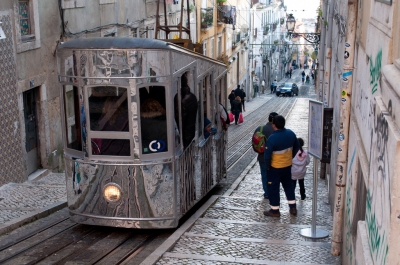
Beach Vacation in February

Best Time to Visit Portugal: Overview
When to visit portugal, best time to visit the regions, climate charts portugal.
In the following, you will find climate charts for the regions.
Furthermore, there are some charts you can use for quick comparison of climate between the regions.
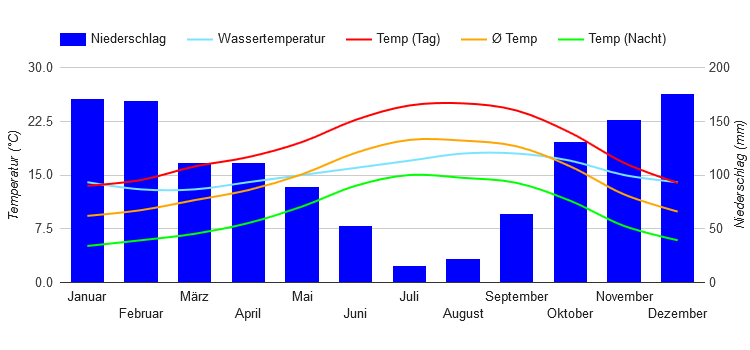
Day Temperatures
Night temperatures, average temperatures, water temperatures, precipitation, hours of sunshine per day.
Source of Data: German Weather Service (Offenbach) and Wikipedia
Climate Tables Portugal
Temperatures, precipitation, sunshine in porto (portugal), temperatures, precipitation, sunshine in lisbon (portugal), highlights and attractions, popular activities, more attractions, current weather and forecast.
Important Regions and Cities

Activities and Attractions
Distances to portugal, where’s portugal, continent: europe, portugal: experiences of our visitors.

Incredible city trip in Lisbon. Pure sunshine and 12 degrees, just right for exploring the city on foot. Were even in Estoril on the beach (foot held in the cold Atlantic Ocean)….. In summer we go to the Algarve, I am curious.
Weather Rating: 5 stars – Excellent

My husband and I were in June – July on the Way of St. James in Porto, dreamlike beautiful city, dreamlike beautiful weather, will repeat this year.

Rain mix with sunshine – 14°C on average in the region Porto and Coimbra during 7 days
Weather Rating: 3 stars – Mixed

pleasant temperature, no rain, sometimes strong wind from the lake, sometimes early fog on the coast.
Weather Rating: 4 stars – Good
The first week was good weather with mild 12 to 16 degrees. After that followed a rather rainy week.
We had wonderful summer weather, sometimes up to 30°, and that in the middle of October! Simply a dream!
The weather was sunny and hot. It was ideal bathing weather. The evenings were mild.

For the beginning of April best weather with temperatures above 20°C during the day, 10-12°C at night.

1 week Algarve, only sunshine, around 28°C, light breeze from the Atlantic Ocean, perfect!
Share your Experience and Win
Portugal in Ultra HD
Destinations in the vicinity ….
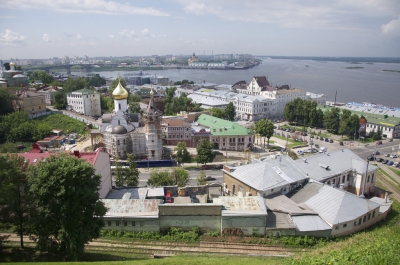
- Imprint / Privacy
- Image Sources
HELPING YOU PLAN YOUR PERFECT TRIP TO PORTUGAL
When is the best time to visit portugal.
This post may contain affiliate links, which means I may receive a commission, at no extra cost to you, if you make a purchase through a link. Please see my full disclosure policy for further information.
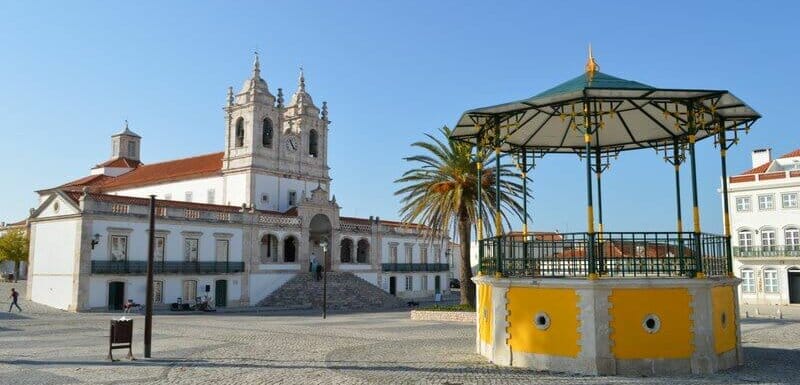
The best time to visit Portugal is as soon as you can! Seriously though, this country has so much to offer throughout the year that there is no bad time to come. Obviously, this depends to some extent on what you want to do when you’re here as certain activities are more seasonal than others.
In this guide to when to visit Portugal, I’ll give you an overview of what to expect from each season and pros and cons of choosing certain months for your Portugal trip. Note that these tips mostly apply to mainland Portugal rather than the subtropical islands of Madeira and the Azores as their climates are quite different.
Take a look at my tips on When is the best time to book a Portugal holiday .
If you want to know which festivals and celebrations coincide with each season, check out this post .
Portugal seasons and the weather
I haven’t bothered including any of the temperature charts you’ll see on other websites as they are, frankly, useless and inaccurate from what I can see.
The weather in Portugal is an increasingly unpredictable beast and lately, the seasons have been all over the place so nothing is a sure thing anymore. Add to that the various micro climates around the country and the best anyone can give you is a rough idea of what you are likely to experience.
However, it’s still possible to make some generalisations and the key is to be prepared for unseasonable weather by checking forecasts before you pack – see my Portugal packing tips .
Jump to a specific season:

Spring in Portugal (March to May)
Summer in portugal (june to mid september).
Autumn in Portugal (mid September to early December)
Winter in Portugal (December to February)

Spring is my favourite season and possibly the best time to visit Portugal. I love it when the countryside starts to wake up with fresh green foliage and colourful wildflowers. Tourist related activities and services that closed for the winter period throw open their doors at Easter and the number of visitors steadily increases from April onwards.
I often travel in Portugal in spring and am usually able to do the things I want to without the weather seriously scuppering my plans. It does help to have some flexibility in your itinerary if you intend to do outdoor activities though.
There will likely be some heavy rain, which has been known to last for several days at a time. Rainy days are usually interspersed with some warmer periods and blue skies, albeit a little cloudy. Dry spring days are ideal for walking, although temperatures start to heat up from May onwards.
Check out these great walking holidays in Portugal
Spring events in Portugal
There are cheese festivals in my area (As Beiras) in March and April, a major fish festival in Lisbon in April, a chocolate festival in Óbidos and a flower festival in Madeira in late April or early May. Revolution Day, April 25th, is a public holiday and often celebrated with concerts and events.
One of my favourite festivals is also the craziest – the Iberian Mask Festival held in early May in Lisbon. Other events include FIMFA, an international puppets festival in Lisbon, and Bracara Augusta, a Roman-themed festival in the ancient city of Braga .
Things to consider when travelling in spring
Accommodation prices are considerably lower in March and April although May can be pricey in popular places. May is one of the most popular months for the Portuguese Camino de Santiago, pilgrimages to Fátima (May 11th to 13th) and for visiting the Douro Valley so book ahead.

Summer weather in Portugal
June and September are usually just about okay for walking around without melting, as long as you avoid the mid afternoon heat – temperatures often reach the mid 30ºCs, especially inland. There is still a chance of rain but it’s less likely than in spring or autumn.
For these reasons, both are popular months for the Camino, especially the Coastal Route . June and September are also good times for walking the Alentejo coast .
July and August tend to be the hottest, driest months although the last couple of years have been more erratic than others with some cooler days that make it a pleasure to be outside.
On very hot days, especially inland, temperatures can soar into the high 30ºs or even 40ºs (Celsius), which is often too hot for me to be outside except for early morning and in the evening. Al fresco lunches may still be possible on those baking hot days if you have a sea or mountain breeze but otherwise, an air conditioned restaurant will make your mealtime more enjoyable.
Portuguese beaches naturally get busier during the hotter months and beach cafés and restaurants are in full swing. Note that river beaches only function during summer months. Some are open from mid June to mid September while most are only fully operational in July and August. The same applies to lifeguards at most coastal beaches.
Tip: If you plan to do much in the way of sightseeing in summer, try to organise your itinerary so that you are in air conditioned museums, or at least places with shade, during the heat of the day (3-5 pm is usually the hottest).
Summer events in Portugal
June is a very active month, especially in Lisbon, which is pretty much em festa , i.e. in party mode, for the whole of June with the biggest celebrations being on June 12th and 13th in honour of St. Anthony. Northern towns and cities, especially Porto, favour St. John with an all night party on June 23rd.
Other events include cherry festivals, lots of big music festivals, including Festival Med in Loulé. Medieval fairs do the rounds, notably in Óbidos, Silves and Santa Maria da Feira. Almost all towns and villages will have some kind of local festival, usually in honour of a saint, especially in July and August.
Popular holiday destinations put on extra events, including free outdoor concerts, craft fairs and food-related festivals to entertain the summer influx of visitors.
Things to consider when travelling in Portugal in summer
Many Portuguese emigrants take the opportunity to come back to visit friends and family in August, artificially swelling the population in some areas. Those Portuguese families without visitors will often go on holiday themselves during August (the Algarve and other beach destinations are favourites) and the atmosphere in cities is noticeably different and more tourist-oriented than in quieter months.
Many independent businesses and restaurants shut up shop for a couple of weeks in August, or even the entire month, so check in advance if you have your heart set on visiting a particular establishment. Some restaurants prefer to take a break in early September after the summer rush has died down.
Accommodation prices are higher in summer, especially July and August, and places fill up fast. It’s best to book as far ahead as possible if you intend to visit Portugal in the summer to get more choice and better prices – see my Portugal accommodation guides .
It is likely to be hotter outside than in so if you are not staying in a place with air conditioning, you need to manage the heat by keeping windows and doors closed once the temperature rises and using shutters and curtains to stop the sun from streaming in and turning rooms into ovens.
Mosquitoes and tiny biting flies are a nuisance so use insect repellents and bring bite cream in case you get stung.
Autumn in Portugal (mid September to December)

Autumn weather
Early autumn in Portugal is another of my favourite times of year. Temperatures should begin to drop to a comfortable level and evenings will be chilly even if the day has been warm and sunny.
There is more chance of rain than in the summer but if you have some flexibility over which days you want to do any walking or outdoor activities, this is a great time to visit. The hoards have gone home and you might still squeeze in some beach time on warmer days. Sightseeing is more fun because it’s cool enough to walk around during the day and not as busy.
Once we’ve had a few rainy days, the parched countryside starts to perk up again with fresh greenery and even a sprinkling of flowers. To add to the colour scheme, you’ve got autumn leaves, which are quite dramatic in the vineyards and oak and chestnut forests.
To get the best of these autumnal colours in Portugal, go to the forests in the Lousã Mountains near Coimbra, the area south of the Serra da Estrela or Montesinho Natural Park in Tras-os-Montes. While there are wine regions all over Portugal where you can see colourful vine leaves, the Douro Valley is quite spectacular in late October, early November.
Autumn activities and events
Autumn is also harvest season in Portugal, although the grape harvest in southern regions can start as early as August. For the Douro, it’s usually in September, which is another reason why the limited supply of accommodation in this area quickly fills up.
Tip: If you dream of staying on a quinta (wine estate) during the harvest, book your room months in advance – see my suggestions for places to stay in the Douro .
Festivals at this time of year include honey and chestnut festivals like the one in Lousã in central Portugal and Miscaros, which is a fun mushroom festival near Fundão. Chestnut sellers will also be in city streets, tempting you with sweet smoke from their carts. November 11th is St. Martin’s day and celebrated with a magusto , which usually involves the first wine of that year, roasted chestnuts and a bonfire.
If you’ve heard tales of mega waves in Portugal, the best time to see them in Nazaré or Peniche is between November and January.

Winter weather
While there is always a chance of rain and storms if you come to Portugal in winter , the dry spells are usually very pleasant, often with blue or slightly cloudy skies and winter sun. It can get quite cold – hats, scarves and gloves may be needed as well as an umbrella – but it’s usually less grim than a UK winter and although the days are short, the earliest it gets dark is around 5 pm in December.
It does actually snow in some parts of Portugal, although there is only one ski resort, in the Serra da Estrela Mountains . Unless you are heading to the hills specifically for the snow, it’s more likely to just be a nuisance if you’re faced with unexpected road closures at altitude. At lower levels, it’s rare to see snow.
If you’re from a cold country and are seeking warmer climes, you could join other foreigners who winter in the Algarve. Although it’s hardly bikini weather, a stroll on the beach in winter is tonic enough. While some tourist-oriented businesses in the Algarve close for the winter there are enough year round restaurants in larger towns to keep you going and the Algarve 365 project offers cultural events outside of peak tourist season.
See my insider tips for visiting the Algarve for more about the Algarve in winter and other seasons.
Find out more about winter fun in other European destinations in this post .
Thanks to bargain prices and a reduced number of tourists, winter is a good time to visit cities like Lisbon and Porto, which have plenty of indoor attractions so that you can dodge inclement weather. You could even go on an underground art tour using Lisbon’s metro system .
Winter activities and events
By early December, the Christmas decorations are out in force in Portuguese streets, brightening up the dark evenings. There are often Christmas markets in the weeks leading up to the special day, offering extra opportunities to buy some quality souvenirs or tasty treats.
New Years’ Eve calls for celebration all over the country but especially in Madeira, which is famous for its fireworks display. Other cities will have displays, usually over a body of water, and a free outdoor concert in the main square. In the Algarve, the place to head for is Praia dos Pescadores.
If you like smoked meats and want to go truly off the beaten track, the Feira de Fumeiro de Vinhais (Smoked Meats Fair of Vinhais) and the Feira Gastronómico de Porco (Pork Gastronomic Fair) in Boticas are a celebration of the traditional art of curing meat. Monchique in the Algarve region has a similar event at the beginning of March.
Carnival usually takes place in February although this pre-Lenten festival is governed by Easter dates. Some towns, e.g. Loulé, Figueira da Foz and Torres Vedras are renowned for their Brazil-style carnival parades where scantily clad ladies shimmy their goose-pimpled flesh through the streets between decorated floats.
I prefer the more traditional entrudo celebrations which have pagan roots and are mostly tied to northern Portuguese villages. Among the most colourful and dramatic are the Caretos de Podence and the carved wooden masks and bizarre costumes and rituals from Lazarim .
February is also the time for almond blossom to brighten up the countryside. The best places to see these puffs of pink and white are in the Algarve and, slightly later in the month, in the Foz Côa region , which has an Almond Blossom Festival, and the Douro Valley.
Things to consider when visiting Portugal in winter
Note that many Portuguese properties are not well insulated or heated so unless you are staying in a hotel with central heating or air conditioning, you will need to check the heating arrangements before renting an apartment. It’s often warmer outside than inside in winter!
Christmas is celebrated with family on December 24th so lots of restaurants and supermarkets will be closed – plan ahead to make sure you have something and somewhere to eat. On December 25th and 1st January most places are closed so bear this in mind when planning your trip – see my article about Christmas and New Year in Portugal for more information .
Most of my fully managed Portugal itineraries are suitable all year round.

HANDY TRAVEL RESOURCES FOR YOUR TRIP TO PORTUGAL
Use these quick links to make your dream trip a reality: Fully managed Portugal itineraries designed by Julie Portugal accommodation guides Browse Portugal travel guides and itineraries in my shop Reserve a room on Booking.com Get a great car rental deal with Discovercars.com Get a quote for travel insurance with Yonder
As an Amazon Associate I earn from qualifying purchases.
Pin for later

We just came back for 16 days in Portugal.. it was cold and rainy most of the trip. It was as you said very cold outside and inside where most places don’t have heat. We came to see about moving there but since we come from the US Virgin Islands and 85 degrees year round we found out quickly this was not going to work for us. Glad we came and saw before we sold our house. Glad I am back in 85, sunny and warm.. I can imagine in the summer Portugal is quite a nice place to visit. In the winter if you are from Oregon, MN, Michigan, Mass. PA etc… anywhere up north I bet they would love it.
Hi Cindie, sorry you had a run of bad weather but this is why it’s so important to visit a prospective country at different times of the year before making a long-term, life-changing commitment. I hope you find a place that suits you better!
Hi Julie, a great article and totally agree regards the weather maps, we recently moved to central Portugal and had visitors in May with temperatures over 30 degrees and visitors in June with 4 days of rain! but the best thing about Portugal is the weather is never an issue there is always somewhere to visit and something to do, thugh sitting at a pavement cafe is still one of our favourite pass times in the sun 🙂
Julie, this is just making me want to go somewhere warmer (like Portugal) now that summer has gone and the weather is getting a bit colder here already… Nice post though 🙂
Over to you. Please share your thoughts in a comment. Cancel reply
Content copyright © Julie Dawn Fox, 2010-2024 | Privacy Policy | Disclaimer & Disclosure | Advertising & Media | Terms & Conditions | Shipping, Refund & Returns Policy | Contact | Camino Português | Sustainability Policy
The Best Time to Visit Portugal: Season Guide (2024)
From summer to winter, I’ve explored Portugal in every season and can tell you exactly when to plan the perfect vacation. The best time to visit Portugal is in September when crowds, prices, and humidity are low, but temperatures are still high enough for sunny beach days!
Ultimately, you’ll need to consider where and why you’re visiting since the weather varies between Lisbon, Porto, Douro, and islands like Madeira.
From the Algarve to the Azores, I’ve broken down the different seasons of Portugal as well as the best places to visit based on interests like surfing, swimming, hiking, and more.
Whether you’re looking for the best weather, perfect beach days, cheap prices, or epic surf, this guide will help you uncover the best month to visit Portugal.
Table of Contents
QUICK GUIDE
Lisbon | Algarve | Porto | Douro Valley | Madeira | Azores
- Best Weather : Early Summer (June-August)
- Rainy Season : Winter (January-February)
- Beach Weather : Summer (June-August)
- Surf Weather: Fall/Winter (September-February)
- Avoid Crowds : Spring/Fall (March-May & September-October)
- Cheap Prices : Early Spring (March-May)
- Festivals : June
- Douro Valley Grape Harvest : Late August-September
- Most Variation : Azores
When is the Best Time to Visit Portugal?
Whether you’re gearing up for Portugal solo travel or checking into a luxury resort, timing your trip just right is everything.
To figure out the ideal month or best season to visit Portugal, consider factors like weather, prices, crowds, and the specific activities on your Portugal bucket list. Each season offers something unique, so it’s important that you choose the right time based on what you want to do.
If it’s music festivals like Primavera Sound Porto you’re after, most of the major cities in Portugal host outdoor concerts from early June until the end of summer.
Keep in mind that different regions of Portugal experience different weather patterns and seasonal fluctuations so don’t just look at the country as a whole if you know you specifically want to check out Algarve beach towns like Faro, Lagos, and Albufeira .
Best Time of Year for a Portugal Vacation
A good time of the year to go to Portugal depends on what you want to do. Check out the options below based on your personal preferences.
The best time to visit Portugal for good weather is during the summer months of June to August. This is when you can enjoy warm temperatures and long sunny days.
Here’s what to expect at different times of the year:
- Spring (March-May): Mild temperatures and blooming landscapes make it an excellent time for outdoor activities.
- Summer (June-August): Warm and sunny weather, perfect for beach vacations and exploring coastal towns.
- Autumn (September-November): Pleasant temperatures and fewer crowds make it an ideal time for sightseeing and cultural events.
- Winter (December-February): Mild weather in southern regions, while northern areas offer a chance to experience snow.
Rainy Season
Though Portugal is generally sunnier than the rest of Europe, it still rains. The rainy season in Portugal generally falls during the winter months, late November to February. The northern regions of the country, particularly the mountainous areas, tend to receive the most precipitation.
On average, Portugal receives around 31 inches (800mm) of rainfall annually, though this can vary significantly depending on the region.
The best time to visit Portugal to surf is during the autumn and winter months when Atlantic swells are at their peak. However, summer can also offer enjoyable surf sessions with smaller waves best suited for beginners.
Surfing in Portugal is a popular activity among locals and tourists alike. With favorable weather conditions, Portugal offers great waves for surfers of all levels. If you want to stay near Lisbon, you can always take a day trip. Learning to surf is one of the best things to do in Ericeira !
Some other popular surfing locations include Peniche and Nazaré. These areas are known for their consistent waves and beautiful beaches, attracting surfers from all over the world. In addition to ideal conditions, Portugal also has a vibrant surf culture, amazing surf schools, and camps for beginners to learn and improve their skills.
Plus, Portugal’s wave quality and variety make it suitable for both shortboard and longboard surfing. Whether you’re looking for fast barrels or mellow point breaks, you can find them in different regions of the country.
READ NEXT: A Complete Guide to Winter in Portugal
Portugal experiences the biggest crowds during summer, particularly in July and August. Traveling to Portugal in winter or during the shoulder seasons of spring and fall is the best time to avoid crowds. From March to May and September to October, the weather is still pleasant, and there are fewer tourists which means shorter lines, better service, and an easier time getting around, especially if you’re using public transportation.
Portugal is a dream come true when you visit in the off-season. I’ve been to Portugal during every season except winter and I highly recommend late September. It was still warm enough to enjoy the beautiful Cascais beaches , but not so hot that I was sweating buckets after climbing those steep Lisbon hills.
Is your vacation time limited to high season? Visit lesser-known regions and attractions that are not as popular among tourists. By exploring off-the-beaten-path locations, you can enjoy a more authentic experience and avoid the crowds.
PRO TIP: Consider visiting Portugal during weekdays rather than weekends to further minimize the number of tourists.
As the crowds disperse, the prices drop!
If you’re looking for cheap prices, there’s nothing cheaper than January and February, but you’ll have to put up with cold weather and quite a bit more rain. Even though Portugal has a Mediterranean climate, you should ask: Does it snow in Portugal? The answer might surprise you!
For affordable prices, I recommend visiting Portugal during the spring months of March, April, and May. This is a great shoulder season when prices for accommodation and flights tend to be lower, but with almost as much sunshine as you’d see during summertime.
Portugal’s magnificent beaches are simply irresistible with their azure waters, golden shores, and wildly beautiful coastlines. I certainly wouldn’t blame you if you insisted on a relaxing getaway to one of the best beach towns in Portugal.
The very best time to visit Portugal to enjoy the beaches and sunny weather is in the summer, between the months of June, July, and August, with August being the hottest month. Portuguese beaches are enjoyable through September, as well. The months of June-September are the best time for swimming!
For avid swimmers, the ideal time to take a dip in the Atlantic waters is also between July and September, when the water temperatures average a balmy 66-73°F (19-23°C).
Outside of the summer months, the temperature of the Atlantic Ocean can drop significantly, requiring a wet suit for swimming and surfing.
Festivals & Events
There’s never a dull moment in Portugal, but certain times of the year offer especially unique experiences you won’t want to miss. Here are the top festivals and seasonal events:
- Festival of Saint Anthony in Lisbon (June): One of the most celebrated parties in Portugal, Festival of Saint Anthony is a tribute to the patron saint of Lisbon, featuring a week of exciting parties and cultural events.
- Surfing Championship in Peniche (October): One of the biggest events in the World Surf League, this competition brings the best surfers from around the world to Peniche’s famous Supertubos Beach.
- Carnaval in Lisbon (February/March): This lively festival is filled with parades, colorful costumes, and vibrant music.
- Porto Wine Festival (June): A week-long festival held at the best port wineries in Porto , you can try a huge selection of wine, along with fun workshops, and cultural activities.
- Óbidos Medieval Market (July/August): A charming, gorgeous town, one of the best things to do in Obidos is to step back in time and experience Portugal’s Middle Ages at Obidos Medieval Market with traditional foods, arts, and a medieval parade.
Seasons in Portugal
Portugal offers a variety of travel seasons throughout the year, each with its own unique charm. Whether you prefer mild temperatures and fewer crowds or vibrant festivals and lively beach days, Portugal has something to offer. Here are four key points to consider:
- Spring: Experience Portugal’s beautiful landscapes and blooming flowers during the spring months. The weather is mild, making it perfect for outdoor activities like hiking and exploring historic sites.
- Summer: Summer is the peak season in Portugal, with warm temperatures and bustling tourist attractions. Enjoy the stunning beaches and vibrant nightlife that the country has to offer during this time.
- Autumn: As the summer season comes to an end, autumn brings cooler temperatures and fewer crowds. This is a great time to visit if you prefer a more relaxed atmosphere, while still enjoying pleasant weather and various cultural events.
- Winter: Portugal in winter sees milder weather compared to many other European countries. While some regions can be a bit rainy, there are still plenty of indoor attractions, museums, and cozy cafes to explore.
It’s worth noting that the best time to visit Portugal’s various regions will vary since they have slightly different climates and experiences during each season. Therefore, it’s essential to research specific destinations within Portugal to find the perfect travel season for your preferences.
Portugal Temperatures by Month
Here’s a look at the average temperature and rainfall in Portugal’s most popular destinations.
The Best Time to Visit Each Region
Looking for the best time to visit Lisbon? Or the ideal time of year to sightsee in the Algarve? Let’s take a look at the weather in each of Portugal’s different regions throughout the year.
Lisbon & Central Portugal
In Lisbon and the Central Portugal region, the weather tends to be more temperate than in the north.
- Average temperature: Around 63 degrees Fahrenheit, with lots of sunshine.
- Best time to visit Lisbon : Spring and fall, specifically from March to May and September to October, are optimal times to visit due to pleasant weather and fewer crowds.
- Worst time to visit Lisbon : The summer months of July and August can be extremely hot and crowded with tourists, while December and January are typically the coldest and rainiest months.
- Special Events: The Festival of Saint Anthony is a massive celebration that takes place in Lisbon every June.
LISBON TRAVEL RESOURCES Any 4 day Lisbon itinerary should include these great activities and day trips!
- Pena Palace: Colorful fairytale castle and one of the most Instagrammable places in Lisbon
- Day Trips: Don’t pass up nearby spots like Cascais , Ericeira , and Obidos
The Algarve
The Algarve, located along the Southern coast, is known for its famously sunny and warm climate with more than 300 days of brilliant sunshine each year, offering the most pleasant weather in all of Portugal.
- Average temperature: Typically ranging between 50-80 degrees Fahrenheit, the region is bathed in sunshine for most of the year.
- Best time to visit Algarve: Late Spring or early Autumn when the weather is pleasantly warm, and the crowds from summer tourists have subsided. For the best surfing in Algarve, be sure to stick around from November up through April.
- Worst time to visit Algarve: Honestly, it’s hard to go wrong in the Algarve with temperatures in the 60s throughout winter and surfing at its peak. However, if you’re after swimming and sunbathing, November-April will leave you pretty disappointed.
- Special Events: The annual world surfing championship takes place in Peniche every October.
ALGARVE RESOURCES
Whether you’re traveling in a group or on an Algarve solo travel adventure, the best way to see the entire coast is to take a series of fun day trips from Faro to spots like Tavira, or even Seville, Spain .
Porto & Northern Portugal
Northern Portugal, particularly cities like Porto , Braga and Guimarães, experiences a cooler climate compared to the country’s southern regions.
- Average temperature: Approximately 55 degrees Fahrenheit, with a higher probability of wind and rainfall.
- Best time to visit Porto: The milder months, when the weather is more pleasant and the chances of rainfall are lower are the ideal time to explore Northern Portugal.
- Worst time to visit Porto: During the winter months, specifically January and February, Northern Portugal experiences relatively harsher weather conditions.
- Special Events: Porto hosts the annual Port Wine Festival every June.
PORTO TRAVEL RESOURCES
- What to Do: Start the day at the best Porto viewpoints before enjoying the epic port wineries
- Day Trips: Get the answer to Is Aveiro worth visiting and start planning your Porto day trips
Douro Valley
The Douro River Valley, renowned for its vineyards, enjoys a Mediterranean climate with hot summers and cool winters.
- Average temperature: Usually fluctuating between 50-85°F, depending on the season.
- Harvest Season: Timing varies between late August and October, so September may be your best bet to soak up the autumn beauty and enjoy harvest festivities.
- Best time to visit Douro Valley: Late spring and early fall are ideal times to see all the best wineries in Douro Valley in full bloom while avoiding the extreme summer heat and humidity, with temperatures as high as 100°F.
- Worst time to visit Douro Valley: The winter months, particularly from December through February are full of cold, rainy days and naked vines. However, you may enjoy seeing the vines pruned the first week of January or smaller tours where you get more of the winemaker’s attention.
Madeira , an archipelago situated in the North Atlantic Ocean, enjoys a subtropical climate. Locals claim that these Portuguese islands are home to the best climate in the world with warm temperatures year-round.
- Average temperature: Ranges from 64-75°F, with the ocean breeze providing a cooling effect.
- Best time to visit Madeira: Pretty much any time outside of the rainy season guarantees an incredible visit full of hiking and gorgeous views.
- Worst time to visit Madeira : The highest rainfall occurs between October and January.
MADEIRA RESOURCES
- See the traditional Santana, Madeira houses that are over 250 years old
- The Fanal Forest is an otherworldly location and one of the only laurisilva forests left
Portugal’s Azores Islands are home to an ever-changing climate that adds an element of excitement to your trip. You can enjoy sunny beaches in the morning before spending your afternoon in a misty mountain surrounded by fog.
- Average temperature: The temperature in the Azores typically ranges between 60 to 70°F, dipping into the 50s in winter.
- Best time to visit Azores: For the best chance of clear, sunny skies and minimal rainfall, plan your visit between June and September.
- Worst time to visit Azores: The months from September to March experience a higher amount of rainfall, with an average of 30 to 45 inches of rain per year depending on the particular island.
Is there a hurricane season in Portugal?
Typically, the period from June through November is considered as the hurricane season in Portugal. Despite this, Portugal rarely experiences direct hurricane hits. Rather, the detritus of these storms often results in rainfall and gusty conditions over the land. The regions most frequently impacted include the Azores, Madeira, and the northern part of the country.
Is Portugal humid or dry?
The climate in Portugal is predominantly influenced by the Atlantic, resulting in a majority of the country falling within the humid zone of the Iberian Peninsula. Portugal experiences a high level of humidity year-round, with certain months being exceptionally humid. The humidity in Portugal is at its lowest in August, with a relative humidity of 60.3%. Conversely, January is the most humid month, recording a relative humidity of 74.7%.
RELATED POSTS:
- Portugal in Winter: Things to Do in December, January, & February
- The Ultimate Lisbon Travel Guide
- The Ultimate Porto Travel Guide
- The Ultimate Algarve Travel Guide
- The Ultimate Madeira Travel Guide
- The Ultimate Azores Travel Guide
- The Complete Portugal Solo Travel Guide
MORE PORTUGAL TRAVEL GUIDES
- 7 Absolutely Darling Douro Valley Wineries
- The 17 Best Beaches in Cascais, Portugal
- Is Aveiro Worth Visiting?
- 25+ Epic Things to Do in Ericeira
- 23+ Outstanding Things to Do in Obidos
- 15 Fabulous Day Trips from Faro, Portugal
Leave a Comment Cancel reply
Save my name, email, and website in this browser for the next time I comment.

You are here
Best time to visit portugal.
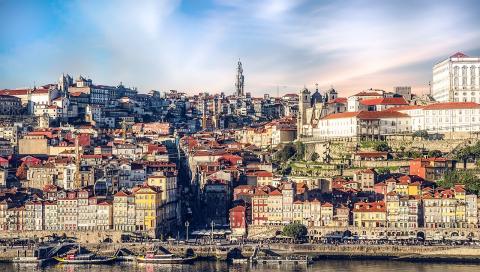
Portugal is the westernmost country of Eurasia. It is situated in south-western part of the Iberian Peninsula. Madeira and Azores Autonomous regions on islands in the Atlantic Ocean are controlled by Portugal. The country has mixed relief. Northern half of Portugal is mountainous while in southern half there are gentle hills and plains.
Climate on most of territory is subtropical Mediterranean with some features of temperate weather conditions. Portugal experiences great influence of the Atlantic Ocean, so there are no sharp temperature shifts. Summers in southern Portugal are dry and mildly hot while winters are cool and wet.
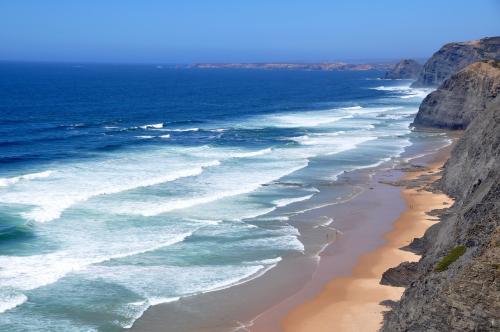
Northern highlands and mountains have cooler weather due to altitude related alternation of weather. Hilly central regions receive some snow in winter. Weather in Azores and Madeira is even milder. In general most of precipitation falls between November and April. Annual amount of precipitation is higher in northern regions.
Season and Low Season
- Low Season
- Climate and Seasonality
Season in Portugal
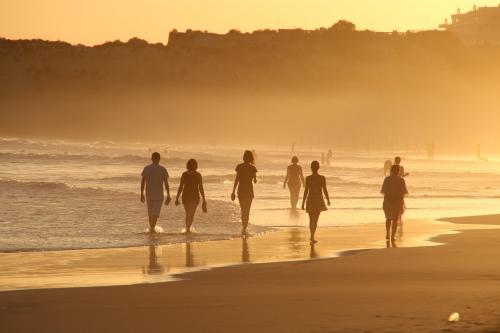
Portugal is some sort of tourist delicacy. Great climate, amazing scenery and well equipped beaches with clean water are making Portugal popular destination of eco-tourism. The country is fifth most popular tourist destination of Europe and it attracts around 10 million visitors each year. The number is equal to population of the country, though, somehow Portuguese cities and beaches never seem too crowded.
Majority of tourists come to the country in summer months when it is warm and sunny. Compering to neighboring Spain summer temperature averages is lower in Portugal. It rarely goes above 30 °C even in July, the hottest month of a year. Temperature of sea is between 17 °C (62 °F) and 23 °C (73 °F) depending on month and location. Beach season is completely suitable for educational tours too. Many periods and nations left their remains in Portugal. Best time for sightseeing in the country is between April and late June with period from September to early November.

Long Atlantic coast of the country is close to perfect for surfing. Even 14-15 °C (57-59 °F) of temperature of the ocean can’t distract devoted adherents of surfing from visit to Portugal. Winter is the time of powerful tall waves while in summer the ocean calmer and surfing is available for people with wider range of skills. In general surfing is available year round.
There is even one ski resort in Portugal. Skiing season is short and it spans only from January to March.
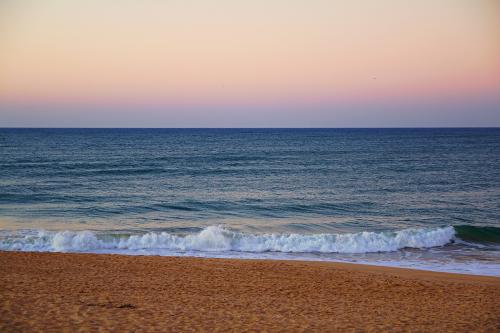
On the other hand there are plenty of spa resorts. Greatly equipped spa resorts with thermal springs and untouched nature of Portugal are scattered around the country. Best time for recreation of such kind is in early autumn and late spring. In addition soccer (European football) season opens in September and lasts to late May.
Low Season in Portugal

Time than may be considered as low season in Portugal is between November and late April. And even in these months people go to Portugal for surfing and vivid celebrations including carnival. In addition during off-season there is reduced pricing on accommodation and recreation in spa centers. On Madeira weather is great year round, but there are no decent beaches.
During off-season it rains in Portugal. Also it is darker due to lesser amount of sunshine hours per day. On the other hand temperatures lower than 10 °C (50 °F) are unusual for the country in general. Southern regions are warmer and some travelers prefer to go to Portugal precisely in winter.
Climate and Seasonality by Month
☀ - hot; ⛅ - comfort; ☔ - rainy t° - average; inch - precipitation ⛹ - health
Water Temperature and Seasonality
t° - average; ⛱ - beach
Our project

Stay connected

Seasons of the Year
- About the Project
- Terms of Use
- Copyright & Permissions
Best Time To Visit Portugal
What is the best time to visit portugal.
The Best time to visit Portugal is during spring and fall seasons as they have a balmy weather, summers are long and hot, while winters are wet and cold. However, the country does not have a particular holiday season - it is an all year round destination, and everything depends on what the visitor wants to see and how they want to spend their time in Portugal. July and August are two of the busiest months in Portugal , as it is the time when many Europeans take their summer holidays. For those who want to enjoy the beach, the ideal season is from June until the end of September . However, for seasoned surfers, a good time to travel is between November and January . Even though the air and sea temperatures are not the warmest, it is during these months that the waves are the most magnificent. Late spring or early autumn is considered as another good to visit the country, as it is less crowded, and the weather is beautiful . It is best that travellers on a budget avoid major holidays like Christmas and Easter. Since these seasons come with long weekends and vacations, flight and hotel prices soar. For those seeking a cost-effective holiday, the early months of spring and autumn, are the best months to travel. As for exploring the historical sites and cultural aspects of Portugal, it is a favourable destination all days of the year.
Portugal Travel Packages
Compare quotes from upto 3 travel agents for free
Best of Portugal Tour Package
Spain and portugal honeymoon tour package, fantastic portugal tour package with sintra day trip, standard summer portugal package - 6 nights 7 days, teasures of portugal holiday 5-star package, portugal spain tour package, more about best time to travel to portugal, portugal peak season, portugal shoulder season, portugal offseason, winter in portugal (december-february), spring in portugal (march-may), summer in portugal (june - september).
- ‘Festas de Lisboa,’ a series of festivals characterised by parades, food streets and colourful street decorations take place in Lisbon throughout June.
- The festivities peak on St. Anthony's Day.
- Early in June, the nine-day long ‘National Agriculture Festival’ takes place in Santarém. Dancing, bullfights, and bull-running are an important part of the festival.
- The ‘Portuguese National Day’ (Dia de Camões) is held on June 10.
- From June 23 to 24, Porto celebrates St. John's Day (Dia de São João), while Évora celebrates St. Peter's Day (Dia de São Pedro), on June 29.
- The Portuguese are big on fireworks and dances during these festivals. 'Festas Santos Populares' (Popular Saints’ Festivals) in June is one of the biggest tourist attractions in Portugal. No matter which city you are in, there will be some festival or the other.
- ‘Assumption Day,’ a religious festival takes place on August 15.
- ‘Our Lady of Nazaré Festival’ on September 8, again, is characterised by the procession, concerts, folk dances, bullfights, and fairs.
- For music lovers, the summers can be one of the best holiday time in Portugal.
- From ‘Rock in Rio,’ Lisbon (outdoor rock concerts) (July) to Sudoeste Festival, Zambujeira do Mar (August), and Festival de Sintra (September and October), several music fests take place throughout the country.
Autumn in Portugal (September - October)
Best time to visit the top destinations in portugal.

Best Time to Visit Lisbon
Best Time to Visit Ponta Delgada
Best Time to Visit Funchal
Best Time to Visit Sintra
Best Time to Visit Cascais
Best Time to Visit Vilamoura
Tourist Places to Visit In Portugal

Ponta Delgada

Browse Package Collections
Top destinations for packages, nearby countries for packages.
Netherlands
Nearby Countries

Get the best offers on Travel Packages
Compare package quotes from top travel agents
Compare upto 3 quotes for free
- India (+91)
*Final prices will be shared by our partner agents based on your requirements.
Log in to your account
Welcome to holidify.
Forget Password?
Share this page

Unveiling the Best Time to Visit Portugal: A Comprehensive Guide to Avoid Crowds

- Post author: Avoid Crowds
- Post published: May 21, 2023
- Post category: Portugal
- Post comments: 0 Comments
Welcome to the land of sun-soaked beaches, historic cities, and world-class wine! Portugal, with its rich cultural heritage, diverse landscapes, and warm hospitality, is a dream destination for many travelers. But when is the best time to visit Portugal for a serene, authentic, and affordable holiday? 🤔
Understanding the tourist seasons in Portugal is key to planning your trip. It’s not just about the weather, but also about avoiding crowds, finding value for money, and experiencing the country like a local. Whether you’re a beach lover eager to soak up the sun on the Algarve coast, a history buff looking to explore UNESCO World Heritage Sites, or a foodie keen to dive into Portuguese cuisine, timing your visit right can make all the difference.
In this comprehensive Portugal travel guide , we’ll unveil the best times to visit Portugal, the benefits of off-peak travel, and practical tips for planning your trip. We aim to help you navigate your way to a crowd-free, unforgettable Portuguese adventure. So, let’s dive in and start exploring the hidden gems of Portugal! 🏖️🏰🍷
Remember, traveling smart is all about finding the perfect balance between your interests, budget, and the level of tourist activity. So, whether you’re planning a summer getaway to the Algarve, a cultural tour of Lisbon and Porto, or a wine tasting tour in the Douro Valley, we’ve got you covered.
Stay tuned as we reveal the secrets to avoiding crowds and maximizing your experience in Portugal. 🧳🌍👍
Why Visit Portugal?
- 🏖️ Beautiful Beaches: Portugal’s Algarve region is famous for its stunning beaches and sunny weather.
- 🏰 Rich History and Culture: From historic cities like Lisbon and Porto to UNESCO World Heritage Sites, Portugal is a treasure trove of cultural experiences.
- 🍷 World-Class Wine: Portugal’s Douro Valley is renowned for its wine production, especially Port wine.
- 🍽️ Delicious Cuisine: Portuguese cuisine, from seafood dishes to the iconic Pastel de Nata, is a must-try for foodies.
- 🎉 Vibrant Festivals: Portugal hosts numerous festivals throughout the year, offering a glimpse into its rich traditions and vibrant culture.

Understanding Portugal's Tourist Seasons
When planning your trip to Portugal, it’s essential to understand the country’s tourist seasons. Each season offers unique experiences, but they also come with varying crowd levels and prices. Let’s break down what you can expect during the high, shoulder, and low seasons in Portugal.
Here’s a quick overview of what to expect in each season:
Remember, the best time to visit Portugal depends on what you want to see and do. By understanding the tourist seasons, you can plan a trip that offers the best value for money and the least amount of crowds.
High Season in Portugal (Summer)
The high season in Portugal typically runs from June to August. This is when the country experiences the warmest weather, making it a great time for beach vacations, especially in the Algarve region. However, it’s also when Portugal sees the most tourists, which can lead to crowded attractions and higher prices.
Shoulder Season in Portugal (Spring and Autumn)
The shoulder seasons in Portugal are spring (April to June) and autumn (September to October). During these months, you’ll find fewer tourists and more affordable prices than in the high season. The weather is generally pleasant, perfect for city tours and wine tasting trips. Plus, you can enjoy beautiful spring flowers or autumn foliage.
Low Season in Portugal (Winter)
The low season in Portugal is from November to March. While the weather is cooler, especially in the northern regions, the southern regions like Algarve still enjoy mild temperatures. It’s a great time to explore Portugal’s cities and cultural sites without the crowds. Plus, you’ll enjoy the lowest prices and festive events like Christmas markets.
The Best Times to Visit Portugal for Different Experiences
Portugal offers a wealth of experiences, and the best time to visit can vary depending on what you’re most interested in. Whether you’re a beach lover, a history buff, or a foodie, we’ve got you covered. Let’s explore the best times to visit Portugal for different experiences.
For Beaches and Coastal Activities
If you’re keen on enjoying Portugal’s beautiful beaches and coastal activities, the summer months (June to August) are ideal. This is when the weather is warmest, perfect for sunbathing, swimming, and water sports. However, remember that this is also the high tourist season, so popular beaches may be crowded.
For City Tours and Cultural Experiences
For city tours and cultural experiences, the shoulder seasons (spring and autumn) are a great choice. The weather is generally pleasant, and the crowds are fewer than in summer. It’s a great time to explore historic cities like Lisbon and Porto, visit UNESCO World Heritage Sites, and attend cultural festivals.
For Wine Tours and Culinary Experiences
For wine tours and culinary experiences, autumn (September to October) is a fantastic time. This is the harvest season in Portugal’s wine regions, and many wineries offer special tours and tastings. Plus, it’s a great time to enjoy Portugal’s culinary delights, from seafood dishes to iconic pastries.
Remember, eachseason offers unique experiences in Portugal. By aligning your interests with the right time of year, you can ensure an unforgettable, crowd-free Portuguese adventure.
The Benefits of Off-Peak Travel in Portugal
Traveling during off-peak seasons can offer numerous benefits, from fewer crowds to better value for money. In Portugal, this typically means visiting during the shoulder seasons (spring and autumn) or the low season (winter). Let’s delve into the advantages of off-peak travel in Portugal.
Fewer Crowds, More Authentic Experiences
One of the biggest benefits of off-peak travel is the opportunity to avoid crowds. With fewer tourists around, you can enjoy a more relaxed, authentic experience. Popular attractions are less crowded, allowing you to take your time and truly soak in the sights. You’re also more likely to interact with locals, giving you a deeper insight into Portuguese culture and lifestyle.
Lower Prices and Better Value
Traveling during off-peak seasons can also offer better value for money. Accommodation prices often drop outside of the high season, and you may find deals on flights and tours as well. Restaurants and shops may also offer off-season discounts. By saving on these essentials, you can stretch your budget further and perhaps even afford some extra luxuries.
Unique Off-Peak Attractions
Finally, off-peak travel allows you to experience unique attractions that aren’t available during the high season. For instance, the Christmas markets in winter offer a festive, local experience. Some cultural events and festivals also take place outside of the high season, offering unique experiences you wouldn’t want to miss.
In conclusion, off-peak travel in Portugal can offer a more authentic, affordable, and unique experience. It’s a smart choice for travelers looking to avoid crowds and make the most of their Portuguese adventure.

Practical Tips for Planning Your Trip to Portugal
Planning your trip to Portugal involves more than just deciding when to go. To ensure a smooth, enjoyable experience, it’s important to consider factors like accommodation, transportation, and crowd management. Here are some practical tips to help you plan your Portuguese adventure.
How to Find Affordable Accommodation
Finding affordable accommodation is key to traveling on a budget. In Portugal, prices can vary significantly depending on the season and location. Here are some tips:
- Book Early: Especially during the high season, it’s advisable to book your accommodation well in advance to secure the best deals.
- Consider Off-Peak Travel: Accommodation prices often drop during the shoulder and low seasons.
- Check Different Platforms: Use platforms like Booking.com to compare prices and find the best deals.
- Consider Alternative Accommodation: Consider options like guesthouses, hostels, or vacation rentals for a more budget-friendly stay.
Navigating Public Transport in Portugal
Portugal has an efficient public transport system, including trains, buses, and trams. Here are some tips for navigating public transport in Portugal:
- Plan Your Route: Use online tools to plan your route and check timetables.
- Consider a Transport Pass: If you’re planning to use public transport extensively, consider purchasing a transport pass for unlimited travel.
- Book in Advance: For long-distance trains and some buses, it’s advisable to book in advance. You can find tickets and tours on platforms like GetYourGuide and Viator .
Essential Tips for Avoiding Crowds
Avoiding crowds can greatly enhance your travel experience. Here are some tips:
- Visit Popular Attractions Early or Late: Many tourists tend to visit attractions in the middle of the day, so try to go early in the morning or later in the afternoon.
- Explore Off-the-Beaten-Path: Consider visiting lesser-known attractions for a more peaceful experience.
- Use a Guidebook: A good guidebook can provide valuable tips for avoiding crowds. Check out these Portugal travel guides on Amazon for recommendations.
Remember, a well-planned trip can save you time, money, and stress. By considering these practical tips, you can ensure a smooth, enjoyable Portuguese adventure.
Conclusion & Useful links
Portugal is a country of diverse landscapes, rich culture, and warm hospitality. Whether you’re soaking up the sun on Algarve’s beaches, exploring historic cities, or tasting world-class wine, the key to a memorable Portuguese adventure lies in smart planning. By understanding the tourist seasons, aligning your interests with the right time of year, and using practical tips, you can experience Portugal at its best – serene, authentic, and affordable.
Remember, the best time to visit Portugal depends on what you want to see and do. Whether it’s the high season’s beach vacations, the shoulder season’s city tours, or the low season’s Christmas markets, each season offers unique experiences. And with off-peak travel, you can enjoy fewer crowds, better value, and unique attractions.
So, are you ready to start planning your Portuguese adventure? We hope this guide has been helpful. Here are some useful links to help you further:
- GetYourGuide : For booking tours and attractions in Portugal.
- Viator : Another great platform for booking tours and attractions.
- Booking.com : For comparing and booking accommodation.
- Amazon : For purchasing Portugal travel guides.
- Visit Portugal : The official travel guide to Portugal.
- PortugalWeather : For checking the weather in Portugal.
- Portugal’s Public Transport : For planning your route and checking timetables.
Happy planning, and here’s to an unforgettable, crowd-free Portuguese adventure! 🇵🇹🌍👍
You Might Also Like

The Most Authentic Porto Experience: Pastel de Nata Cooking Class

The Best Day Trip from Porto: Douro Valley Wine Tour with Lunch, Tastings & River Cruise
Leave a reply cancel reply.
Winter is here! Check out the winter wonderlands at these 5 amazing winter destinations in Montana
- Travel Destinations
The Best Time To Visit Portugal
Published: October 9, 2023
Modified: January 3, 2024
by Krissy Bazemore
- Plan Your Trip
- Travel Tips
Introduction
Portugal, located on the western coast of the Iberian Peninsula, attracts millions of visitors each year with its picturesque landscapes, rich history, and vibrant culture. Whether you’re strolling through the narrow streets of Lisbon, exploring the historic sites of Porto, or lounging on the stunning beaches of the Algarve, Portugal offers a diverse range of experiences for all types of travelers.
But when is the best time to visit this beautiful country? The answer depends on various factors, including the weather, the crowd levels, and your preferred activities. In this article, we will explore the different seasons in Portugal and help you determine the ideal time for your visit.
With its Mediterranean climate, Portugal is generally blessed with mild winters and warm summers. However, the weather can vary significantly from region to region, so it’s essential to familiarize yourself with the specific characteristics of each season before planning your trip.
From the bustling capitals to the peaceful countryside, Portugal offers a plethora of attractions and activities to suit every traveler’s interests. Whether you’re a history buff eager to explore ancient castles, a foodie looking to indulge in authentic Portuguese cuisine, or an outdoor enthusiast seeking adventure in nature, this enchanting country has something for everyone.
So grab your sunscreen, pack your bags, and get ready to embark on a memorable journey to the land of fado music, delicious pastries, and warm hospitality. Let’s dive into the different seasons in Portugal and discover the best time to experience its magic.
Weather and Climate
Portugal experiences a mix of Mediterranean and Atlantic climates, resulting in diverse weather conditions throughout the country. The overall climate is characterized by mild winters and hot summers, making Portugal an appealing destination year-round.
In the northern regions of Portugal, such as Porto and Braga, the climate is generally cooler and wetter compared to the south. Summers are warm, with temperatures ranging from 25-30°C (77-86°F), while winters can be cool, with temperatures averaging around 10°C (50°F). Rainfall is more frequent during the winter months, so be prepared for some precipitation if you’re visiting during this time.
In central Portugal, which includes Lisbon and Coimbra, the climate is slightly milder. Summers are warm and dry, with temperatures often reaching the high 20s°C (mid to upper 80s°F). Winters are milder compared to the north, with temperatures rarely dropping below 10°C (50°F). Rainfall is relatively low in this region, particularly during the summer months.
The southernmost part of Portugal, known as the Algarve region, enjoys a Mediterranean climate with long, hot summers and mild winters. Summer temperatures can soar above 30°C (86°F), attracting beachgoers from all over the world. Winters in the Algarve are mild, with temperatures ranging from 10-15°C (50-59°F). This region experiences significantly less rainfall compared to the rest of the country.
It’s important to note that Portugal’s weather can be unpredictable at times, so it’s advisable to check the forecast closer to your travel dates. Additionally, the country’s coastal geography influences local microclimates, so beach areas can be slightly cooler and windier than inland regions.
Overall, Portugal enjoys favorable weather conditions throughout the year, making it an excellent destination for outdoor activities, sightseeing, and beach relaxation. However, depending on your preferences and tolerance for heat or cooler temperatures, certain seasons may be more suitable for your visit.
Peak Season
The peak tourist season in Portugal falls during the summer months of June, July, and August. This is when the weather is at its warmest, and the country is filled with vacationers from all over the world. The coastal areas, especially the Algarve, become bustling with beachgoers seeking sun, sand, and relaxation.
During the peak season, you can expect long days of sunshine and minimal rainfall. The temperatures can soar above 30°C (86°F), creating ideal conditions for beach activities and water sports. It’s important to note that popular tourist sites, such as Lisbon’s historic neighborhoods or Porto’s wine cellars, can be crowded during this time, so be prepared for longer queues and higher accommodation prices.
If you’re planning to visit Portugal during the peak season, it’s advisable to book your accommodations and activities well in advance to secure your preferred options. Additionally, be prepared for higher prices, particularly in popular tourist destinations, as demand is high during this period.
Despite the crowds and higher costs, the summer months offer a lively and vibrant atmosphere in Portugal. From music festivals and outdoor concerts to street parties and cultural events, there are plenty of opportunities to immerse yourself in the local culture and festivities.
Overall, the peak season in Portugal is perfect if you’re seeking sun-soaked days at the beach, vibrant nightlife, and a lively vacation atmosphere. However, if you prefer quieter and less crowded experiences, you may want to consider visiting during the shoulder or low seasons.
Shoulder Season
The shoulder seasons in Portugal, which fall between the peak and low seasons, are considered ideal times to visit for those who want to enjoy pleasant weather, fewer crowds, and more affordable prices. The shoulder season typically includes the months of April-May and September-October.
During the shoulder season, the weather in Portugal is usually mild and comfortable. Springtime brings blooming flowers, while autumn offers a stunning display of colorful foliage. Temperatures range from the low to mid-20s°C (mid-60s to mid-70s°F), making it perfect for outdoor activities, sightseeing, and exploring the country’s diverse landscapes.
One of the advantages of visiting Portugal during the shoulder season is the decreased number of tourists. Popular tourist sites, such as historic landmarks, museums, and attractions, are less crowded, allowing you to enjoy a more relaxed and immersive experience. Additionally, accommodation and flight prices tend to be more affordable compared to the peak season.
If you’re interested in experiencing Portugal’s cultural events and festivals, the shoulder season offers a delightful mix of celebrations. In April, you can witness the captivating Semana Santa (Easter Week) processions in cities like Braga and Óbidos. In September, Lisbon hosts the Festas de Lisboa, a month-long celebration of music, dance, and traditional festivities.
Another advantage of visiting during the shoulder season is the accessibility to outdoor activities. Hiking in the lush Douro Valley, biking along the Alentejo coast, or exploring the mystical Sintra Mountains are all enjoyable experiences without the scorching heat or overcrowded trails.
Overall, the shoulder season in Portugal provides a balance between favorable weather, fewer crowds, and more affordable prices. It’s an excellent time to explore the country’s cultural heritage, indulge in delicious cuisine, and immerse yourself in the natural beauty that Portugal has to offer.
The low season in Portugal, which generally occurs during the winter months of November to March, offers a unique and tranquil experience for travelers. While the weather may be cooler and some tourist services may have reduced operating hours, visiting during the low season has its own set of advantages.
One of the main benefits of visiting Portugal during the low season is the significant decrease in tourist crowds. You’ll have the opportunity to explore popular attractions, such as the Belem Tower in Lisbon or the São Bento Railway Station in Porto, without the usual hustle and bustle. Additionally, accommodations and flights are often more affordable during this time, allowing you to enjoy Portugal on a budget.
The weather during the low season varies across the country. In the north, temperatures can range from 5 to 15°C (41 to 59°F), while in the south, you can expect slightly milder temperatures of around 10 to 20°C (50 to 68°F). While there may be occasional rainfall, it’s still possible to enjoy outdoor activities such as hiking, visiting historic sites, or exploring charming towns and villages.
Visiting Portugal during the low season also provides a unique opportunity to experience the country’s cultural events and festivals. In December, you can witness the festive atmosphere during Christmas markets and enjoy traditional holiday cuisine. In January and February, you can partake in the colorful Carnival celebrations, with parades, costumes, and street parties taking place in cities like Lisbon and Torres Vedras.
Another advantage of visiting Portugal during the low season is the opportunity to interact with locals on a more personal level. With fewer tourists around, you can immerse yourself in the local culture, try authentic Portuguese dishes at cozy restaurants, and experience the warmth and hospitality of the Portuguese people.
Overall, while the low season in Portugal may have cooler temperatures and reduced tourist services, it offers a quieter and more intimate experience of the country. It’s a perfect time to engage with the local culture, explore at your own pace, and enjoy the charm and beauty of Portugal without the crowds.
Festivals and Events
Portugal is a country rich in culture and traditions, and there are numerous festivals and events throughout the year that showcase its vibrant spirit. These celebrations offer a unique glimpse into the country’s history, music, dance, and culinary delights.
One of the most iconic festivals in Portugal is the Festa de São João, held in Porto on the eve of June 23rd. This lively street party celebrates the city’s patron saint, São João, with music, fireworks, and the traditional hitting of plastic hammers on people’s heads for good luck. It’s a night filled with joy and festivity as locals and visitors take to the streets to dance, sing, and enjoy the festive atmosphere.
In Lisbon, the Festas de Lisboa takes place throughout the month of June. This month-long celebration includes street parades, concerts, traditional dances, and culinary feasts. The highlight of the festival is the Santo António Parade, where locals dress up in colorful costumes and carry statues of the beloved saint through the streets.
If you’re a fan of music, the NOS Alive Festival in Lisbon is a must-visit event. Held in July, this internationally renowned music festival attracts top artists from around the world, spanning genres such as rock, pop, and electronic music. It’s a three-day extravaganza of live performances, creating an unforgettable experience for music lovers.
In the autumn, the Douro Valley comes alive with the grape harvest, and several wine festivals take place to celebrate this important time of the year. The Festa das Vindimas in September in the town of Palmela is a fantastic opportunity to taste the region’s wines, watch traditional grape treading, and immerse yourself in the winemaking culture of Portugal. Similarly, in the Alentejo region, the Festa do Vinho in Borba showcases the region’s wines, accompanied by local gastronomy and traditional music.
The religious festivals in Portugal are also a significant part of the cultural calendar. The Festa do Senhor Santo Cristo dos Milagres in the Azores, held in May, attracts thousands of pilgrims who gather to honor the image of the Holy Christ of Miracles. The Procession of the Holy Spirit, celebrated throughout the country in May and June, is a religious and social event where communities come together to feast, pray, and share traditional meals.
These are just a few examples of the diverse festivals and events that take place in Portugal throughout the year. Whether you’re interested in music, wine, religious traditions, or simply immersing yourself in the vibrant local culture, there’s bound to be a festival or event that will enhance your visit to Portugal.
Budget Considerations
When planning a trip to Portugal, it’s essential to consider your budget and make informed decisions to ensure a financially comfortable and enjoyable experience. Here are some budget considerations to keep in mind:
Accommodation: Portugal offers a range of accommodation options to suit every budget, from luxury hotels to budget-friendly guesthouses and hostels. Consider staying in more affordable accommodations or opting for mid-range options to save on accommodation costs.
Transportation: Public transportation in Portugal, including buses and trains, is generally affordable and reliable. Consider using public transportation to get around instead of relying on taxis or rental cars, which can add up significantly in costs.
Food and Drinks: One highlight of visiting Portugal is indulging in its delicious cuisine. In general, eating out in local restaurants and cafés is relatively affordable, especially if you opt for traditional dishes like the famous bacalhau (salted cod). To save money on meals, consider opting for local eateries instead of touristy establishments.
Activities and Sightseeing: While some attractions in Portugal may have entrance fees, many others, such as strolling through picturesque neighborhoods or enjoying the natural beauty of the country, are free. Research free or discounted days for popular attractions and take advantage of walking tours or self-guided explorations to save on sightseeing expenses.
Timing: Consider visiting Portugal during the shoulder or low seasons, as prices for accommodations and flights are generally lower during these periods. Look for special deals and promotions to make the most of your budget. Additionally, be aware of popular festivals and events, as prices may increase during these times.
Shopping: Portugal is known for its traditional crafts and products such as ceramics, cork items, and local wines. While it’s tempting to buy souvenirs, be mindful of your budget and consider shopping at local markets or seeking out authentic, affordable items.
By carefully considering these budget considerations, you can have a wonderful time exploring Portugal without breaking the bank. With a little planning and smart decision-making, you can make the most of your budget and enjoy all that this beautiful country has to offer.
Popular Tourist Destinations
Portugal is a country filled with captivating destinations that offer a mix of history, natural beauty, and cultural experiences. Whether you’re looking for a vibrant city atmosphere, picturesque coastal towns, or charming countryside landscapes, Portugal has it all. Here are some popular tourist destinations to consider when planning your trip:
Lisbon: The capital city of Portugal, Lisbon, is a dynamic and colorful city known for its steep hills, historic neighborhoods, and stunning viewpoints. Explore the narrow streets of Alfama, visit iconic landmarks like the Belém Tower and Jerónimos Monastery, and take in panoramic views from São Jorge Castle. Don’t miss indulging in local delicacies like pastéis de nata (custard tarts) and experiencing the vibrant nightlife in the Bairro Alto district.
Porto: Located in the north of Portugal, Porto is a UNESCO World Heritage site and renowned for its picturesque old town, charming riverfront, and iconic bridges. Explore the narrow streets of Ribeira, visit the historic cellars where Port wine is produced, and take a relaxing boat cruise along the Douro River. Be sure to try the local specialty, the Francesinha sandwich, and take in the panoramic views from the Dom Luís I Bridge.
Algarve: The Algarve region in the south of Portugal is famous for its stunning coastline, golden sand beaches, and vibrant beach towns. Enjoy sun-soaked days swimming or surfing in Lagos, Albufeira, or Faro, and explore the dramatic cliffs and caves of Ponta da Piedade or Benagil. For a change of pace, visit the charming town of Tavira with its Moorish influence and relax in its peaceful atmosphere.
Sintra: Just a short distance from Lisbon, Sintra is a fairy-tale destination known for its enchanting palaces, mystical forests, and romantic gardens. Explore the colorful Pena Palace, wander through the intricate pathways of the Quinta da Regaleira, and visit the hilltop Castle of the Moors. The charm and beauty of Sintra make it a must-visit destination for nature lovers and architecture enthusiasts.
Évora: Located in the heart of the Alentejo region, Évora is a historic city with well-preserved Roman and medieval architecture. Explore sights such as the Roman Temple of Évora, the stunning Cathedral of Évora, and the Chapel of Bones. The city is also known for its gastronomy, so be sure to sample local delicacies like the Alentejo-style pork and wines from the region’s vineyards.
These are just a few examples of the popular tourist destinations in Portugal. Each region has its unique charm and offers a different experience, so take the time to explore and discover the hidden gems that this captivating country has to offer.
Outdoor Activities
Portugal is a paradise for outdoor enthusiasts, offering a diverse range of activities amidst its stunning landscapes. Whether you’re seeking adventure, relaxation, or natural beauty, Portugal has something to offer for everyone. Here are some popular outdoor activities to consider during your visit:
Hiking: With its varied terrains and breathtaking landscapes, Portugal offers numerous hiking opportunities. The lush greenery of the Azores and Madeira islands provides scenic trails, while the rugged cliffs of the Algarve coastline offer dramatic coastal walks. The Peneda-Gerês National Park in the north is a hiker’s paradise, with stunning waterfalls, mountainous trails, and rich biodiversity to explore.
Surfing: Portugal is a renowned destination for surfers from around the world, thanks to its powerful Atlantic waves. From the renowned breaks of Nazaré, where record-breaking waves have been surfed, to the stunning beaches of Ericeira and Sagres, there are plenty of surf spots to suit all levels. Take a lesson or rent a board and experience the thrill of riding the waves in Portugal.
Cycling: With its varied terrains and scenic routes, Portugal is an ideal destination for cycling enthusiasts. The Alentejo region offers quiet country roads and stunning vineyards to explore, while the Douro Valley provides challenging climbs and breathtaking views. For a coastal experience, cycle along the Rota Vicentina, a long-distance trail that stretches along the southwestern coast of Portugal.
Golf: Portugal is a popular destination for golfers, thanks to its excellent golf courses and pleasant weather. The Algarve region is particularly renowned for its world-class golf resorts, offering stunning coastal views and challenging fairways. From Vilamoura to Quinta do Lago, golfers can enjoy top-notch facilities and beautifully designed courses.
Water Sports: Portugal’s coast and rivers offer a wide range of water sports activities. Besides surfing, you can try your hand at windsurfing or kitesurfing along the west coast, or enjoy kayaking and paddleboarding in the tranquil rivers and lagoons. The Azores and Madeira islands are perfect for diving and snorkeling, with crystal-clear waters and vibrant marine life.
Rock Climbing: The cliffs and rock formations of Portugal provide a playground for rock climbers of all levels. The Arrábida Natural Park near Lisbon is a popular spot for climbers, offering routes for beginners and experienced climbers alike. The central region of Portugal, with its limestone cliffs and caves, also offers great climbing opportunities.
Whale Watching: The Azores Islands are one of the best places in the world for whale watching. Take a boat tour and get up close to these magnificent creatures in their natural habitat. From humpback whales to dolphins and sperm whales, the Azores offer an unforgettable wildlife experience.
These are just a few examples of the outdoor activities available in Portugal. Whether you’re seeking adrenaline-pumping adventures or tranquil nature experiences, Portugal’s diverse landscapes provide ample opportunities to enjoy the great outdoors.
Portugal is a captivating destination that offers something for every type of traveler. Whether you’re interested in exploring historic cities, lounging on beautiful beaches, indulging in delectable cuisine, or immersing yourself in the rich culture and traditions, Portugal has it all. By considering the different seasons and their characteristics, you can choose the best time to visit based on your preferences, weather preferences, and budget.
The peak season in Portugal, during the summer months, attracts crowds with its warm weather and lively atmosphere. The shoulder season, in the spring and fall, offers comfortable weather and fewer crowds, making it a great option for those seeking a balance between good weather and affordability. The low season, in the winter months, provides a quieter and more intimate experience, with discounted prices and the opportunity to engage with locals on a deeper level.
Regardless of the season, Portugal’s vibrant festivals and events are worth experiencing. From the lively street parties of São João in Porto to the month-long celebrations of Lisbon’s Festas de Lisboa, there’s always something happening to immerse yourself in the local culture.
With its diverse landscapes, outdoor activities in Portugal are abundant. Hiking through the scenic trails, surfing the Atlantic waves, cycling through vineyards, or indulging in water sports along the coast – there is an activity for every adventurer and outdoor enthusiast.
Whether you’re exploring popular destinations like Lisbon, Porto, or the Algarve, or venturing off the beaten path to discover hidden gems, Portugal will charm you with its history, natural beauty, and warm hospitality. So, plan your visit, pack your bags, and get ready to create unforgettable memories in this enchanting country.
No matter the season you choose to visit Portugal, your journey will be filled with rich experiences, friendly encounters, and awe-inspiring landscapes. Start planning now and get ready to embark on an adventure you won’t soon forget!

- Privacy Overview
- Strictly Necessary Cookies
This website uses cookies so that we can provide you with the best user experience possible. Cookie information is stored in your browser and performs functions such as recognising you when you return to our website and helping our team to understand which sections of the website you find most interesting and useful.
Strictly Necessary Cookie should be enabled at all times so that we can save your preferences for cookie settings.
If you disable this cookie, we will not be able to save your preferences. This means that every time you visit this website you will need to enable or disable cookies again.
MyPortugalHoliday.com
The best independent guide to Madeira
Madeira intro - Top 10 Madeira - 1 Week ideas - Funchal - Cruise ship - Porto Moniz - Best Beach - Arieiro Mountain - Porto Santo
Madeira weather and when to visit
Madeira is often referred to as “the island with the eternal spring”, and this is the best way to describe the varied weather of the island.
The island sits in the middle of the Atlantic Ocean and the Gulf Stream, nullifying any extreme seasonal temperatures, while the prevailing winds and high mountains ensure rain falls throughout the year. Considering that Madeira is on the same latitude as Morocco, the weather is much less intensely hot during the summer, reaching a pleasant average of 26C in August.
There are two distinct seasons to Madeira: a slightly cooler and wetter winter (October to April) and a drier and warmer summer (May to September), but the location on the island has just as much an effect on the weather as the time of year.
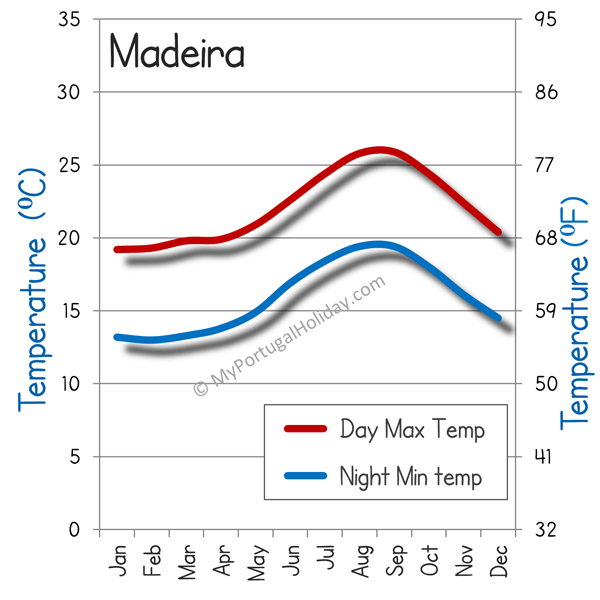
The majority of the rain falls on the interior mountains or the rugged northern coastline, while the east and south (including the main city of Funchal) are significantly drier. The eastern side, close to the airport, maybe drier but is often exposed to strong winds.
Just by simply crossing the island you can leave hot sun in Ribeira Brava, pass through cold mountain fog at Serra De Agua, and get drenched by an intense rainstorm at Sao Vicente. This variable weather causes locals to joke “that you can experience all four seasons just by moving round the island”.
In summary, Madeira has great weather during the summer (except for June!) and winter months that may be cloudy and wet, but will be much more pleasant than mainland Europe. Related articles: Introduction to Madeira – Madeira top 10 - 1 week in Madeira
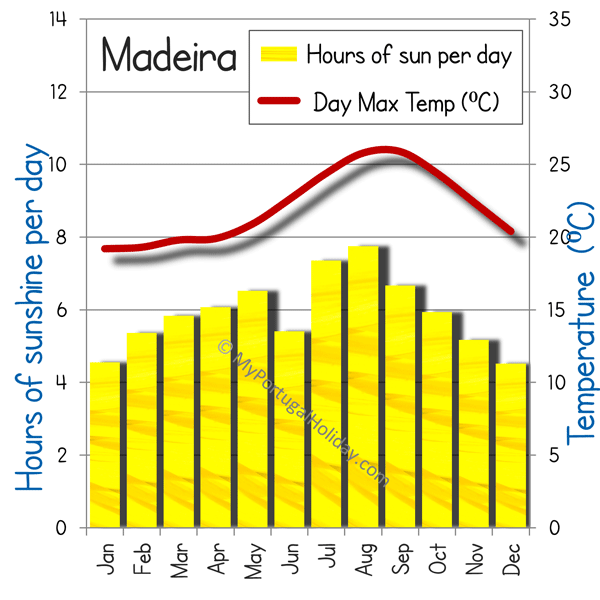
A quick summary of when to visit Madeira
January to March - (Low season) – An equal number of grey days as bright sunny days, but there is always the chance of heavy rains especially over the mountains
4 weeks after Easter – The Flower Festival, the whole of Funchal is adorned with flowers and the island is full of colour (a great season to visit)
June – Dry and warm, but the island can be covered by solid clouds for days, often referred to as “June gloom”.
July-September (High season) – Warm, dry weather and is the best season to visit
October-December (Medium season) - There is an increase of cloud and chance of rain but there can be bright and warm spells. This is a popular season for travellers getting away from the dismal weather of Europe.
Note for June: The typical weather for June is for dense cloud, but it varies yearly. If you come expecting full sun and sunbathing weather (as with the rest of Portugal), you will be disappointed, but if you come for a sightseeing holiday, you will have a great time.
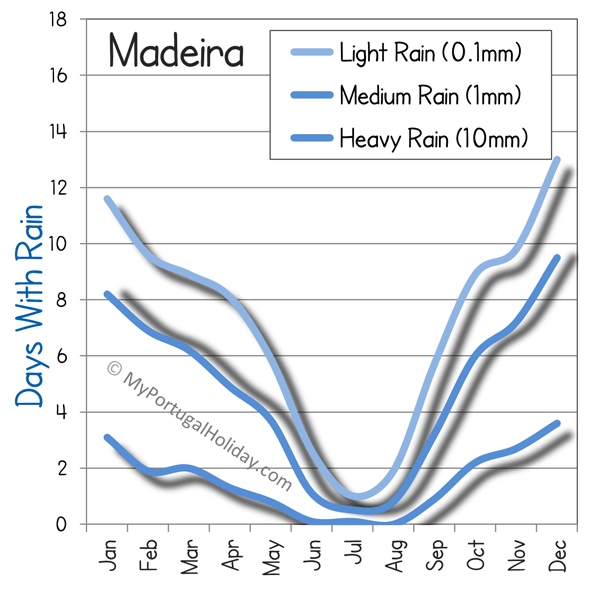
Note: These weather charts are the average weather for Funchal, where the majority of tourists are based during their holiday. The north and west coastline will always be slightly wetter and cooler.
Average weather charts for Madeira
When is the best time of year to visit madeira.
The best time of year to visit Madeira is between July and September, when the weather is at its warmest and driest.
This weather is warm but not incredibly hot as with much of southern Europe, reaching a maximum of 26C in August (as compared to 31C for Rome or 32C for Madrid). As this is the peak season the island will be busy with tourists and accommodation and flights will be at their most expensive.
Our favourite time to visit Madeira is during the Flower Festival, which lasts for the four weeks after Easter. The culmination of the festival is the carnival (check local listings for exact dates).
Madeira in the winter
Madeira is not a winter sun destination, as with the Canary Islands or Egypt, but it will be significantly better than back in your home country. The closer to December, the higher the chance of rain showers and overcast days, but the average temperature will be pleasantly warm.
To get the most from a holiday in the winter season, it is best to have flexible plans. When the weather is dry and sunny, take day trips to explore the island, or if the weather is poor, relax at your hotel, have long meals and drink some Poncha!
Our most popular guides for Madeira
Madeira Home

Introduction to the wonderful island of Madeira
When to visit?

What is the best time of year to visit Madeira and average weather

What are the top 10 activities and sights of Madeira?

Itineraries and tours for a 1-week holiday to Madeira
Need a Hotel?

Reviews of Madeira's hotels and bookings at the lowest price!

The captivating capital of Madeira
Pico Ruivo Hike

The mountain hike between Pico Ruivo and Arieiro is stunning
Girao Skywalk

Walk the glass skywalk out over 580 high cliffs!
Cruise Ship

How to get the most from your 1-day cruise stop in Funchal and Madeira?
Pico do Arieiro

Stunning mountains which are easy to reach from Funchal
Sandy beach

Where is the best sandy beach on Madeira?
Porto Moniz

Charming town, perched on the dramatic north western tip of Madeira
Porto Santo

Take a day trip to the island of Porto Santo
A complete list of all of our guides to Madeira and Portugal
Getting Started
- Madeira Introduction
- Madeira's best Hotels
- 1 week Madeira & Funchal
- Madeira Weather and when to visit?
- Funchal Weather
- Popular sights and activities
- Funchal guide
- Curral das Freiras
- Pico Ruivo and PR1.2
- Pico do Arieiro Mountain
- Camara de Lobos
- Cabo Girao Cliffs
Algarve Towns
Algarve Introduction Albufeira Alvor Faro Guide Lagos Loule
Madeira Guides
Day trip to Porto Santo Best Sandy Beach? 1 day on Madeira (cruise ship tour) Funchal Day Trips Things to Do in Porto Moniz
Portimão Praia da Rocha Praia da Luz Quarteira Sagres Silves Tavira Portugal Vilamoura
Around Portugal
1 week in Portugal A weekend in Portugal Portugal's best beaches Top 10 Portugal Berlenga Islands Cascais Coimbra Estoril Evora Guimarães Lisbon Mafra Obidos Porto Sesimbra Sintra Tomar
Madeira weather and when to visit © 2024 MyPortugalHoliday.com - Privacy Policy & Contact Page

The best guide to Madeira

COMMENTS
The high season - June to August - is the best time for the beach. Early summer is one of the liveliest times to visit Portugal, as the festival calendar is packed. Warm, sunny days are the norm, and while tourism picks up, the hordes have yet to arrive, particularly in the first half of June. During the summer months, you'll also find ...
"Lisbon is one of the warmer European capitals, so even in the off-season you'll be treated to sunshine and warm temps," said staffer Emily in our Portugal Travel Guide. Winter is also the best time of year to visit Portugal to take advantage of off-season travel prices. Months to experience winter in Portugal: December, January, and February
The best time to visit Portugal is during the shoulder seasons of May to June and September to October. You will have the ultimate combination of good weather, fewer crowds, and plenty of local festivities to keep you busy. Like many places in Europe, tourists tend to flood the streets of Portugal during the peak summer months.
Here's an in-depth guide on the best time to go to Portugal, with fun activities to enjoy during each season. Best Time To Visit Portugal. Photo by Aayush Gupta on Unsplash. The best time to travel to Portugal depends on your purpose of travel. January and February months witnesses vibrant costumes and elaborate parades as the country ...
Best time to visit. The best time to visit Portugal is in spring (March-May), when the country is in bloom and waking after the winter. You could also go in fall (between September and October) when the sun is still shining, the weather is warm, and many of the crowds have dispersed. Summer (June-August) can get very hot, particularly in ...
Winter also begins Portugal's holiday season, so it can be an extra magical time to visit. Moreover, Portugal doesn't get a ton of travelers in winter, so hotel rates are generally more affordable — except for the mountainous regions, where snow sports draw travelers from all over.
Portugal, where the sun shines 300 days a year, is a destination that combines rich history, stunning landscapes, and a vibrant culture. From Lisbon's bustling streets to the Douro Valley's wine regions and the Algarve's sun-kissed beaches, Portugal offers diverse experiences. This guide explores the best times to visit Portugal, considering factors like weather, tourist […]
The months of March, April, May, or September are the best times to visit Portugal for heavenly weather and a peaceful atmosphere. This time of year is the sweet spot in the shoulder season, with fewer crowds, heat, and cheaper prices. However, figuring out the best time to visit for you isn't quite that simple.
If you are looking for an escape from the cold European winter weather up north, January may be the best time to go to Portugal! Nighttimes can drop to around 7°C, so bring a sweater. For warmer weather, the Azores are a good option: the highs are 17°C, and the lows are 11°C.
In my opinion, Autumn could be the best season to visit Portugal. From September to November, temperatures hover between a comfortable 15°C to 25°C. It's harvest time in the vineyards, so you can have a grape ol' time wine tasting in the Douro Valley. The smaller towns in central Portugal, like Coimbra and Aveiro, are especially ...
Roughly speaking, the low season in Portugal runs from November to March, excluding the weeks surrounding Christmas and New Year's Day. Many resort towns will go quiet during the winter, but for deal-seekers, it's an incredible time to explore Lisbon. Hotel rates plummet, museums are blissfully free of crowds, and you can finally snag a ...
You can travel to Portugal all year round, as there are climatically different regions. In winter, the northeastern Serra da Estrela is popular with skiers and other winter sports enthusiasts. ... In the very south of the country, the bathing season lasts until October, when the water temperature of the Atlantic rarely exceeds 20 °C. In the ...
Spring is my favourite season and possibly the best time to visit Portugal. I love it when the countryside starts to wake up with fresh green foliage and colourful wildflowers. Tourist related activities and services that closed for the winter period throw open their doors at Easter and the number of visitors steadily increases from April onwards.
Portugal is a dream come true when you visit in the off-season. I've been to Portugal during every season except winter and I highly recommend late September. It was still warm enough to enjoy the beautiful Cascais beaches , but not so hot that I was sweating buckets after climbing those steep Lisbon hills.
Season Low Season; Climate and Seasonality; Season in Portugal. Portugal is some sort of tourist delicacy. Great climate, amazing scenery and well equipped beaches with clean water are making Portugal popular destination of eco-tourism. The country is fifth most popular tourist destination of Europe and it attracts around 10 million visitors ...
Weather in Portugal in Winter Winter is a low tourist season in Portugal, but proper planning could make it a delightful and benefiting holiday. To enjoy the beaches is not an option during winters, but it is a perfect destination for those seeking to explore the historic towns, stunning scenery and vibrant nightlife.
November - March. Cool, rainy (mild in the south) Low. City tours, Christmas markets. Remember, the best time to visit Portugal depends on what you want to see and do. By understanding the tourist seasons, you can plan a trip that offers the best value for money and the least amount of crowds.
Peak Season. The peak tourist season in Portugal falls during the summer months of June, July, and August. This is when the weather is at its warmest, and the country is filled with vacationers from all over the world. The coastal areas, especially the Algarve, become bustling with beachgoers seeking sun, sand, and relaxation. ...
In general, November through January tends to be rainier, but with plenty of sun even during the rainy season and temperatures that never get too low, even the off season brings plenty of magical vacation opportunities. Like many places in Europe, July and August are the peak tourist season in Portugal. August, in particular, is very busy due ...
The best season to visit Portugal is their peak tourist season and summer season, which generally lasts from July to August. Temperatures in the ocean are higher in the summer, especially in the southern region of the Algarve. In July and August, the water is warm, and most people visit the beach to soak up the rays.
Discover the best month to visit Portugal for optimal weather, exciting festivals, and unforgettable sightseeing. Explore stunning beaches, hike nature trails, and indulge in water sports. Enjoy lower prices, fewer crowds, and immerse yourself in the local culture during the off-season. Weather in Portugal Throughout the Year
The best time of year to visit Madeira is between July and September, when the weather is at its warmest and driest. This weather is warm but not incredibly hot as with much of southern Europe, reaching a maximum of 26C in August (as compared to 31C for Rome or 32C for Madrid). As this is the peak season the island will be busy with tourists ...